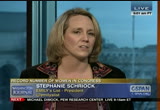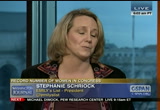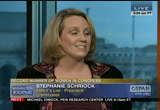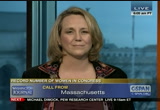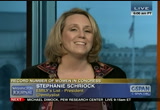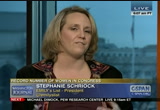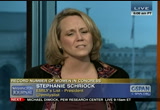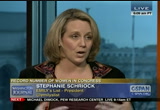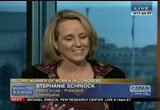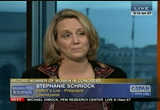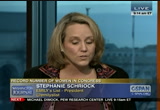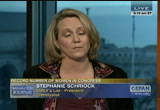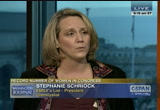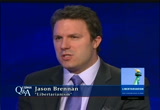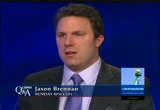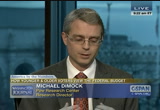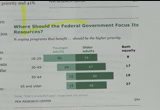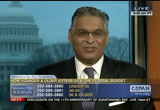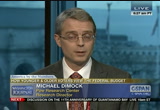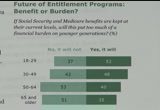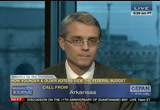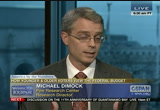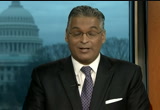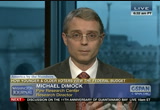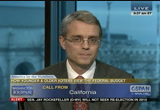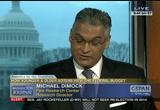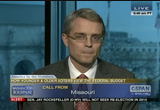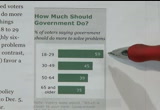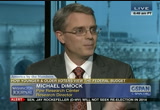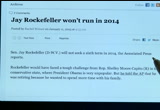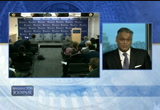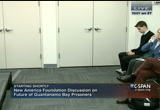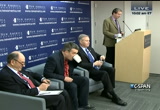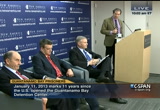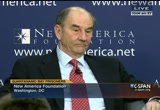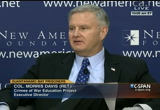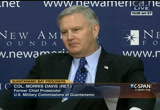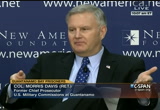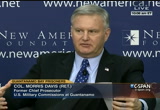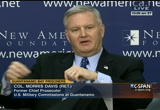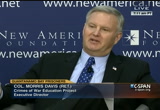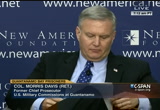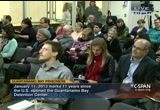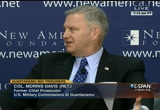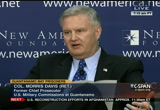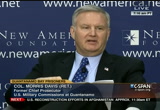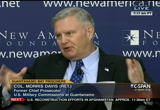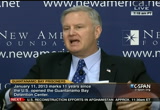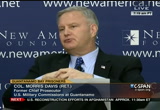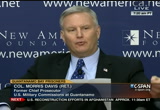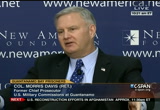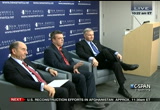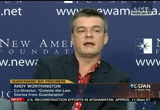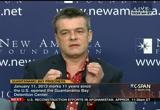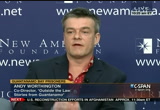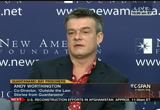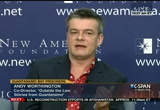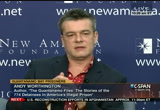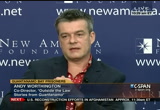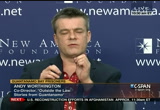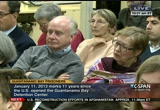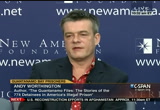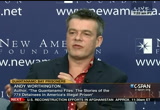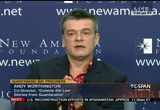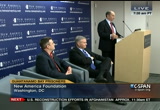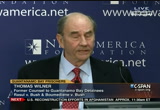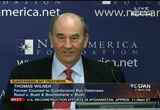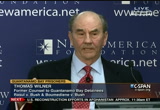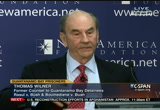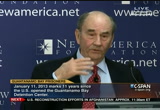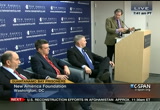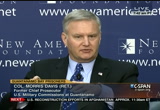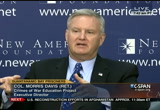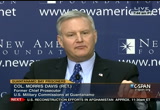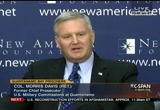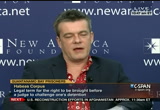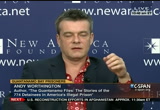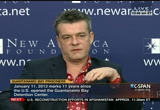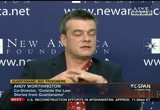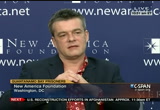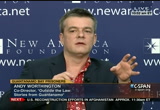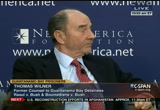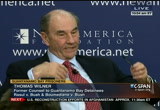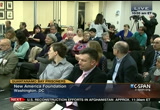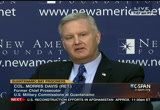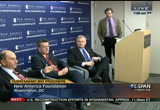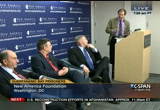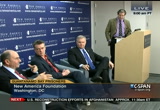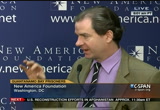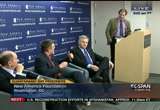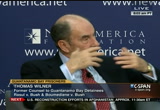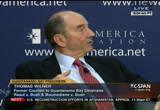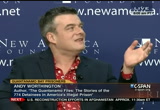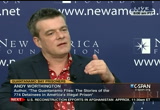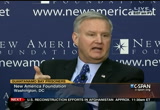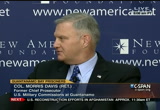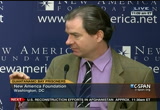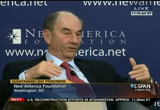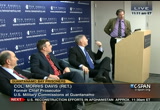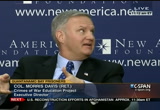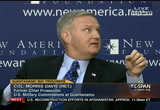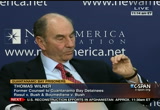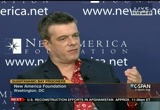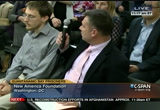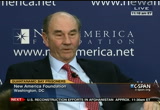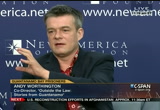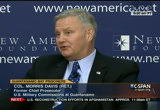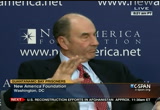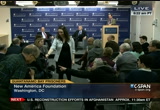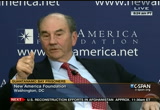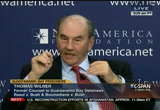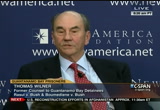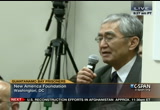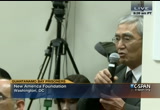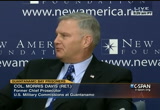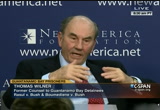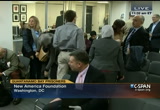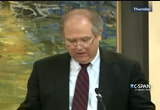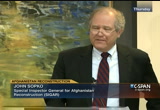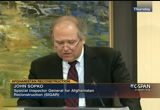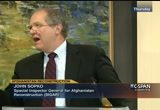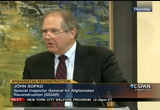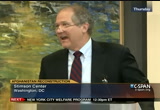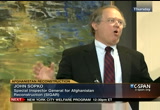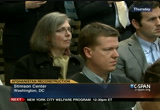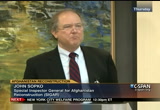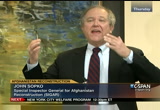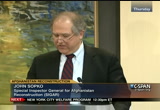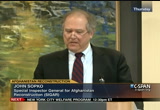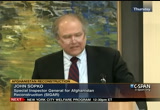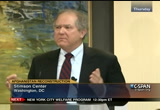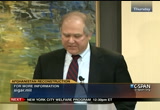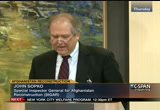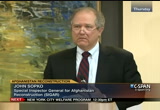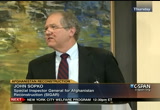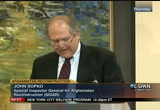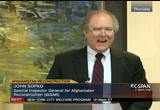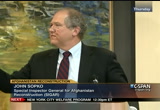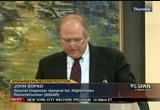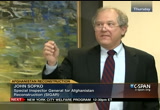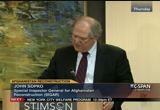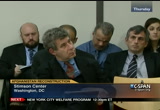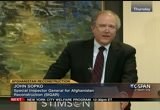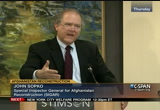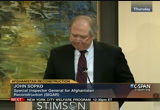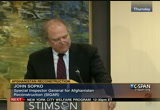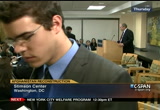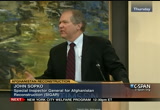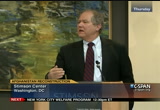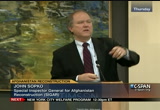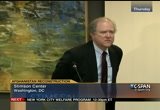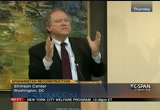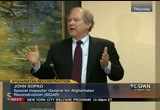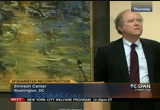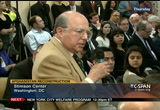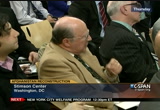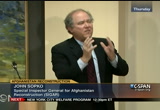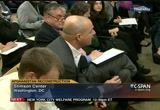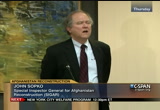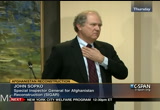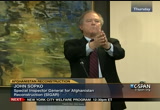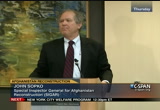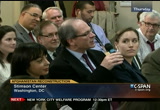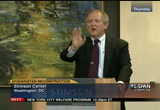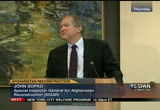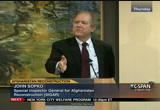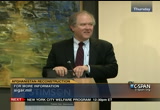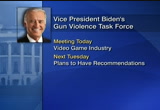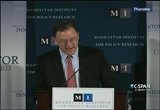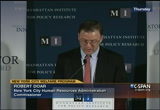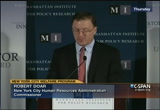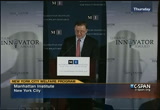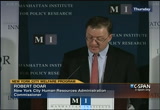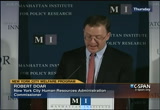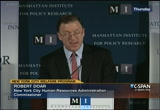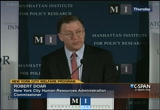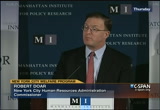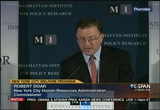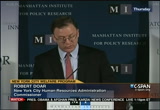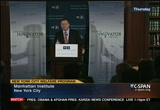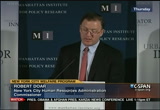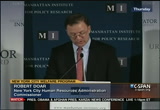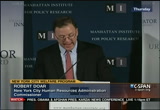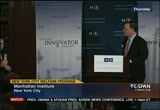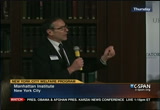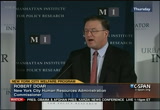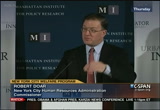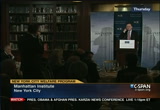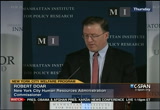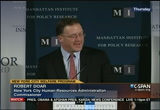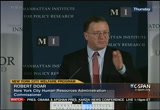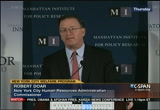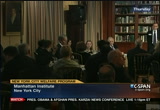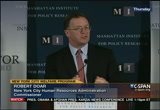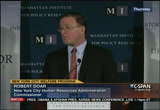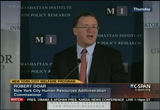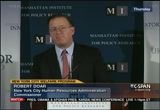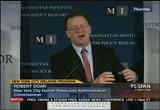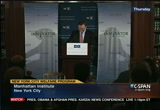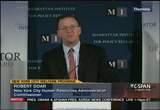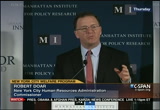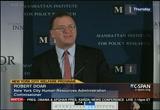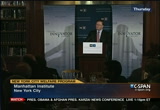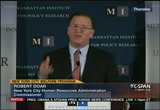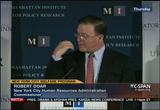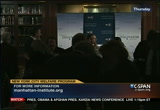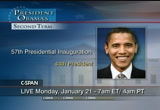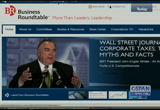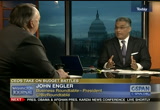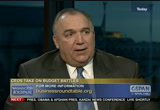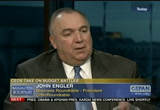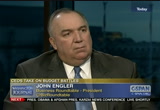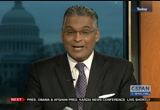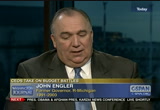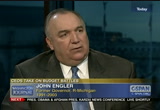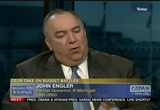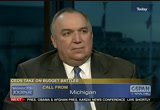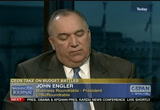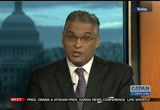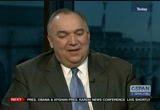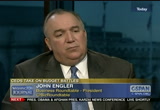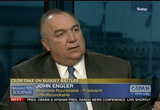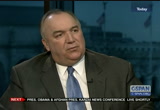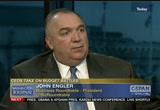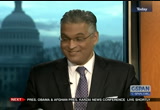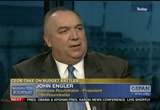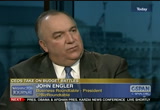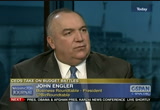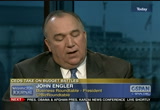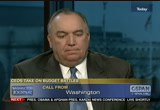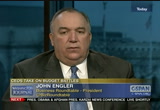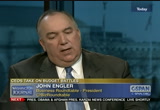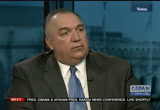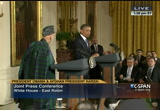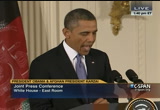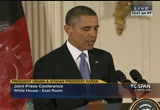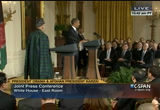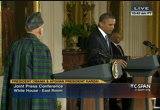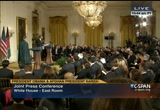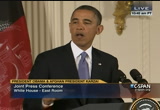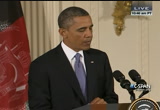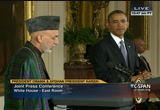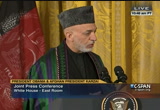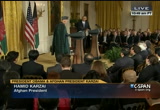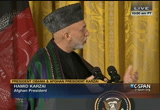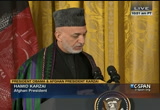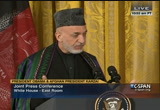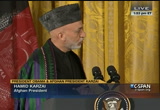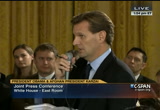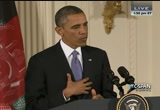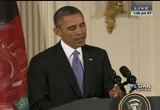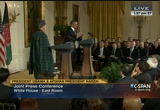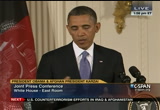tv Public Affairs CSPAN January 11, 2013 9:00am-2:00pm EST
9:00 am
the debate over the first fiscal cliff, is something that this congress has set upon themselves, these fiscal cliff s. i think there are some really good ideas and proposals by the president to make some significant cuts. democrats and republicans are going to sit down and try to find answers for our economic situation. we have to do it. the good news, i believe, is that we have a lot of new members. i'm proud to say we have a lot of new democratic women that will be in discussions, " like senator warren, tammy baldwin. it corrects and on the leadership side, who are the ones to watch as far as --
9:01 am
host: and on the leadership side, who are the ones to watch? guest: we have a woman on the budget committee and of course, nancy pelosi on the house side. as you mentioned earlier, the new congressman from phoenix, ariz., when she was growing up, she lived in such poverty that her family lived in an abandoned gas station for two years with no electric anything. by the way, this -- she is in her 30's. this was not 60 years ago. this was 30 years ago. these are some folks who have been through some life experiences. they know what people are going through. get some solutions
9:02 am
and that means getting our economic house in order and giving opportunity for folks to succeed in this country. host: in virginia, good morning. caller: good morning. i understand that your goal is to increase the number of women in government, but i have problems squaring up with not a a supporting republican women or women who are not pro-choice. are you quitting makers? or are you -- are you queen makers? are you just there to raise a lot of money for a particular party? your comments say that you are setting the nation forward, which is almost an arrogant thing to say.
9:03 am
guest: you've got to keep in mind where we have been and where we are going. we have 20 women in the united states senate. we have 80 men. there are only 16 democratic women in the senate, and four republican. we have a long, long ways to go. wasunited states of america 77th in the world in the percentage of elected women to office. we cannot as an organization take on the whole problem. we believe that we need more women. our piece of the port -- of the puzzle is to elect pro- choice democratic women. the democratic party is for the most part pro-choice. the vast majority of the women we work with our approach was anyway. -- our pro choice anyway.
9:04 am
as the organization, when we started women were not running. part of what we do is not so much to choose them and make it happen, but we encourage women to step up and take this on. we need a lot more of that. we do not have enough women running for office in this country. host: why not the republican party? guest: it is not something that women think of doing right away. there is a study done by rutgers a couple of years ago that asks the question of all of these legislatures, women and men. how many times did you need to out -- be asked before you ran? the women had to be asked seven times before they would say yes. and of the men cannot they did not really have to be passed -- and of the men, they did not
9:05 am
really have to be asked. it is not a good or bad thing. it is just the difference. part of our job is encouragement. we are here to say you can do this. it is not impossible. and we have an organization of support around two to take this step. -- around you to take this step. host: richard is on our democrats line. caller: good morning. sheila bair, who leads the fdic and others, they want the bankers -- they warned the bankers and wall streeters that they were taking too much risk. naturally, they were not listened to. a bunch of white males.
9:06 am
there is a difference between house, between men and women. you are much more risk averse. you look at the picture, women do. you compromise. and in the business were world's -- in the business world, there are very few women who sit on the board of directors of these corporations. that is a glass ceiling that has not been broken yet. i would like your comments. guest: i'm glad you mentioned the corporate boardrooms. there are none -- there is much research done about corporations. when they get three or more women on their boards, they actually see their profits increase. there is a liberal research that shows you do better when you have a closer to equal number
9:07 am
of men and women at the table, not just in government but in corporations. that makes sense to me. it seems logical to me. people think differently. not all women are the same and not all men are the same. but we all know that women and men are different. i think we need both views to move things forward, both in corporations, law firm partnerships. i would like to see women and there as well. and part of what we need to do is think about whether there are barriers for women to move into these corporals or into these law firms? do we have an education system supporting women in this process? it comes down to how we are supporting the family structure. that is often what it comes down to. and that is a question for more and more men today. you think about men who are on the part of track and women who
9:08 am
are on this mommy track. -- men who are on this partner track and women who are on this mommy track. i know more and more men who want to go coach soccer at night. host: there is a story in psychology today in january talk about women voting and the psychology behind it. part of the information was the data behind the pilot test. guest: it is tough. we just did some research this post-election. there has always been a sense that women will vote for women. women will vote for women if they really see that woman in a way that she is accomplished,
9:09 am
viable, and have the same belief system. it is more likely women will vote for democrats first. and there is an 18-point gender gap in the presidential alexian. and it went to president obama. -- in the presidential election. and it went to president obama. does it matter that we have women in there? why does it matter? and we ask the question, we just elected an historic number of democratic women. you think it will matter? and 56% of these independent and said yes. only 8% said no. that is a significant change. part of our job here at emily's list, and argue in government and politics, is to say it does matter. women's leadership is important for our society.
9:10 am
that is part of what we're doing here. host: republican line in georgia. caller: thank you for taking my call. the fellow from va a kind of stole my thunder. you keep presenting your position and the position of your firm as a woman's organization. in actuality, all it is is a democratic women's organization. since the other guy stole my thunder, i just wanted to make that point. i hope my friends and colleagues in the republican party are listening to how the democratic party and folks like yourself have done a fantastic job of packaging the little pieces of a voting bloc and appealing to certain people and basically saying, here is the only option that you really have. i think you have done a wonderful job of presenting your
9:11 am
case. i hope that my republican brethren and sisters will get together and create groups like yourselves. guest: i want to address one point they're prepared the packaging of little quirks. -- one point there. the packaging of little groups. we talked to women in this country. women are 51% of the population. the last time i checked, that is the majority of the voters. and actually, women vote more than men anyway. we're talking about a huge majority of the population. granted, they are not all democrats. and i realize that. what we have seen at analyst list among independent and -- at emily's list among
9:12 am
independent women, two things. one is, they're really looking for candidates who understand their lives and you have the right priorities to move the country forward. and they are very opposed to candidates who want to roll the clock back, particularly on our rights and freedoms when it comes to access to health care or economic rights. that is one of the reasons we did so well this year with women in electing women. women want someone who is going to move this forward. that is a big part of what we're doing here. and what these independent women do not want our candidates who are going to roll the clock backwards. -- our candidates who are going to roll the clock backwards. host: next caller. caller: i am an independent and an african-american male.
9:13 am
i am concerned because i understand the struggle and plight of women. i have never been chauvinistic with equality. but i also understand the backlash from the struggle of women trying to reach equality of -- as people, regardless of gender. but i notice that has more women progress in the urban community, the more households are broken up. the more men that are in prison. women and of single parents. -- women and up single parent, i would like to know your opinion about what solution we can offer to keep families together long term, despite our different light -- plights in order to stay together. we have seen a lot of
9:14 am
changing in the last decades with women entering the workforce. i will not pretend to have the answers to this -- these questions, but i will say this, the women stepping up to run for office, these are women who have either come out of this environment, out of an urban center in particular. we have our own struggles in the rural parts of america. we need to bring these things to the discussion. that is what we need to do. i do not think we will find solutions to the questions that the caller had until we get those people living with the struggles of the table. that means more women, more african-americans, more hispanics, more men and women of color. i feel strongly that we need more women in this discussion. we're still sitting at 20% of congress. we have a long way to go.
9:15 am
host: caller in richmond, democrats line. caller: i was wondering how we will ever get equal pay when states like virginia have the right to work law and they can fire you for any reason. and the company i work for, if you discuss what you make to another employee, you can get fired. guest: it is about laws. laws are made by elected officials. who is representing us at the state legislature and in congress matters. we can overturn right to work laws. and we can pass it will pay laws. we need the right people to support these kinds of changes for our economic future. host: hillary clinton, if she decides to run for president, what does she have to consider in your opinion? guest: in my opinion, she's got
9:16 am
to decide to run. she would be fantastic. she has been an incredible secretary of state. the democratic party -- even in a poll earlier this week in a primary setting, already at 56% and the next person at 16%. it is really up to her to make a decision. i think she deserves all the time she needs to make it. if she makes the decision not to take it on, because she has given so much of her life to sure shervice, and i'm will continue in one way or another, i do think it is time to have a woman on the ticket in 2016. i think we will see really great women stepping up and running in 2016, 2020, and 2024. the bench is deep and growing. we have senators who right now, joe klobuchar -- senator klobuchar from new hampshire. we have secretaries like
9:17 am
kathleen sebelius, who was the governor of kansas, not an easy gig to get. and janet nepalitano, previously the governor of arizona. both of them could step up and running for president. and that is before the next two years before we -- when we have 38 governorships up for reelection. that is the bench for 2016, 2020, and 2024. we want to see a woman on the ticket. host: thank you for your time. today, we take a look at the difference between how older and younger voters view the upcoming budget battles and issues related to the budget.
9:18 am
>> adkins could -- hopkins could read the president's move unlike anyone else. he came as close to getting in his madness -- his eyes were tortured crawled heavily forested. he knew when to be still in the presence of the president. he knew when to press him. and when to back off and tell a joke. after he won the election, wendell -- wendell willkie, whom he beat, with in his office. they remain friends. and he said to the president, why do you keep that man so close to you? that man, being hopkins. will he did not like hopkins. and pres. said kamal you may be
9:19 am
it -- the president said, you may be in this office someday he asks for nothing but to serve me. >> david role on the hopkins touch sunday at 10:00 p.m. eastern on book tv on c-span2. >> if you ask how many ourself identified libertarians, people who would describe themselves as libertarian, the penny on which poll you are looking at, you may get between 10% to 15%. if you ask people a battery of questions about different ideological things. if you believe in export do you believe in -- if you believe in this or you believe in god, you may get up to 30% of people -- if you believe in this or you believe in that, you may get up to 30% of people identifying themselves as libertarian spiris.
9:20 am
if you ask most americans if they want smaller government, they say yes. if you want them -- if you ask them if they want a government to spend less money, they say yes. but if you ask them to cut a particular thing out of the budget, they do not really want to cut anything. it is as low as 10% and as high as 30%. libertarians, if they were political, they could be a big movement. it could be a big group of people that have a shared ideology and influence in politics. for various reasons they are not organized that way. >> political primary and libertarianism. author jason brennan on what you might not know. sunday night at 8:00 p.m. on c- span's q&a. host: joining us, michael demoss --
9:21 am
michael by mark of the pew research center. any report looking of voters, but our young voters and/or old -- a new report looking out voters. but how young voters obverses older voters look at entitlement. guest: these clearly have different implications for the process. the other generation is skeptical that they ever will be part of the process. host: common philosophy would say, if you are younger, you are not paying attention to it much, but if you are much older, things like social security, it matters more. guest: young people are not paying a lot of attention to these debates. it is not there type priority. it is not and they are thinking about regular. -- regularly.
9:22 am
host: one of the information pieces that came out as far as age influence, when it comes to the idea of social security verses reducing the deficit. for those 18 to 21, reducing the deficit was more important. could you give some context to those numbers? guest: this is a fascinating charge because it goes the opposite direction of most generational break and come to the world of government and spending. in general, the number generation is much more positive about the role that government can play in society.
9:23 am
they supported obama's stimulus earlier on. they see a broader role for government in solving problems, dealing with poverty and other things. when it comes to social security and entitlements, the curve ben's the other direction. part of it is linked to the fact let's seniors, who are often skeptical of government, see these programs working very well and being very effective. part of it is that young people are less focused and confident that these programs will be there to help out. host: the sustainability of these programs, how does that factor into how you ask these questions? guest: we ask the people in the survey if you think there direc. part of it is linked will -- if we keep these programs as they are, how you think we will pay for them down the road? the other generation -- the younger generation is skeptical that we will have them. even in the 30-45 age range as well, they are skeptical. host: our guest is talking
9:24 am
about entitlement programs and the like. we have divided the phone lines by age. the numbers are on the screen. you can send us a tweet or e- mail. clarify which age bracket you fallif we keep into if you do t. another chart, instead of me going through the details, what is this jar trying to say and what did you find from it? guest: the government should be helping younger people and older people at the end of the day. if you ask people individually, they want to help both groups.
9:25 am
there's a lot of support for helping the young and old. but as a trade-off, the younger folks in think that the government should be more focused on helping people get started in their lives. seniors really do want to protect the role that government plays in making sure that seniors do not fall through the cracks. host: as they get older, 59% of the respondents say, no, pay more attention to the older adults. guest: and you do not want to get the impression that there is generational warfare behind us. in fact, one of the things that stands out about generation in american politics is that even though there are some very big polite -- divided politically in terms of the role of government and spending, there is not a lot of friction or tension between younger and older americans. they do not see a lot of difficulties or distinctions.
9:26 am
i think a big part of that is that we are all parts of families have one level or another. the challenges that seniors face are not the challenges that i face -- are the challenges that i face or the younger people face because we have grandparents and grandchildren. at the end of the data -- end of the day, we are not heading in the direction of generational warfare. host: on capitol your view -- capitol hill you hear the rhetoric about our children and our children's children. guest: right, and at the end of the day, the question remains of what kind of sacrifices they're ready to make. host: pick the line at best suits you. call with your question or comment. this is jack, a first, massachusetts.
9:27 am
he registers himself as under 35. caller: i am 22 years old when i see it on the page account much money is going to social security and medicare, i wish i could opt out. i have no faith does it will be there when i would want it or use it. other than that, i cannot comprehend how dysfunctional congress is. everybody is arguing about what to cut when everything needs to be cut. host: to your response, the recent expiration of the payroll tax holiday, which would affect every american's jet. guest: the issue of social security is an interesting one. younger generations are very confident in government programs. they think they run better than older adults do in a variety of ways, whether it is respect -- with respect to the environment or something else.
9:28 am
at with regard to social security thompson -- and with regard to social security, when it comes to something the republicans have put forward, the idea of privatizing social security and allowing people to put money in their accounts, that is a popular idea among the underwriters. older voters are very skeptical about shifting debt. -- shifting back. host: here are the numbers. to fill in the context guest: -- fill in the context. guest: young voters are concerned about what is being taken from their paychecks may not be available when they get there. it is not that they resent their
9:29 am
-- their grandparents or their parents, but the concern is that they look forward to their own situation. is it going to be there for them? host: arizona prepared identifies himself as a 36-55 years old. caller: i know the younger callers there said he would like to opt out of social security. but if he gets a disease and it takes in downtown -- it takes him down, that is what medicare and social security are for. i think our congressmen and senators can find a lot of waste and fraud to cut out instead of cutting social security. guest: that is a common feeling
9:30 am
among a lot of people. it is not that younger people, feel the social security and medicare are failing. when we asked people whether they think these programs have been affected, most young and old say they think they have been -- effective, most young people and older people say they have been. it is when you get to the long term trajectory of the programs that you see real and differences along generational lines about where the programs are headed, about what is going to be available and whether substantial changes need to be made. host: talk about how you put this report together. who did you talk to? guest: we talked to a random sampling of people all across the country. the focus was to try to understand generational dynamics. coming out of the 2012 election to we have seen two election cycles, really, almost 3, where we have seen the largest gaps in voting along age lines that we
9:31 am
have seen in a long time. people tend to think that young people always vote democratic. that is not true. as recently as 2000, there was no difference between how people under 30 and how people over 30 voted between bush and gore. if we are seeing more of a generational difference right now. the purpose of this particular study was to see how that applies to this issue, which is very generational in nature, entitlements. host: we have a link if you want to look for it. or you can go to the pugh, research center yourself and look at it. there is. carol identifies herself as 56 or older. she is from new jersey. caller: good morning. i understand that according to the news, mr. bernanke, the head
9:32 am
of the federal reserve, is currently in the process of monetizing our debt to the tune of $86 billion per month indefinitely. and he is doing now to buy mortgage securities and treasury bills. do you have any comment on that? guest: there is a lot of divide in american politics over how big of an issue the deficit is. in fact, we have been asking a question for the past four to five years that says, what should be the priority for the government these days, spending to help the economy recover, or reducing the deficit? that is the fundamental debate. the american public is split almost 50-50 ... throughout this time frame. there are many people who see stimulus as the more immediate priority. there are other people who say we've got to tackle the deficit first. that is what we are seeing
9:33 am
happen in washington, d.c. typically, it is the number generations who are more supportive of the kind of thing you are describing, that the government needs to do something to get this economy turning. part of that reflects the position of many of these younger people who have been hit harder by this economy that older generations. they're having difficulty getting careers going. the number of people who have moved back in with their families when they were hoping to move in a different direction. we have seen the burden of this economic downturn being felt by gambert people. they typically -- by younger people. they typically focus on getting the economy going. seniors have not been as effective, partly because the entitlement programs are there to protect them from that. they are emphasizing the deficit mortar -- more. host: if you did a survey, 56%,
9:34 am
and get the benefits should stay as they are. 32 percent said that the budget deficit was a priority. a% said both. and then there is the gap. guest: the folks that do not know. this is the question that shows a larger generational divide. the younger folks see the deficit as a priority over benefits. host: richmond, virginia. sabrina. let's go to sandra next. go ahead. caller: i think you are asking the wrong questions of young people. i have young children, too. they're kind of selfish and they do not understand what will happen to them richmond, virgin. when they are 65 years old. they put money into the stock markets and the stock market
9:35 am
crashes and then they have no money. who will they look at to support them? the government. i think you should be asking them different questions. guest: i think it is true. young people are trying to assess policies that will affect them 40 years down the line. part of it is their skepticism about what is in place now still being in place for them. part of it is another attitude that we see among younger folks, and this may be more about age. they are willing to experiment a little bit more. there are open to the idea that these programs have been in place pretty much in their current form for many decades. why not experiment? why not try different things? uber folks, by their very nature, are open to that. -- younger folks, by their very nature, are open to that. host: the caller brought up her children and selfishly, and it prompted me to another truck
9:36 am
about generational responsibility. guest: this is whether it is a responsibility. here we are getting out of the policy realm and more in the family rahm. what kinds of responsibilities do we have intergenerational olli? these differ a lot across generational lines. there is not really a sense of generational tension prepared -- attention. the white majority of people, young and old, -- the vast majority of people, down an old, feel that we need to take care of our parents as they get older. i think the people do see the current economic downturn has a special case. a lot of parents understand that their children have had trouble
9:37 am
getting a start in their career in these circumstances. you are seeing more families moving in together in these situations. host: nick statistics and older. -- 56 and older. good morning. caller: i would like to ask if it would give us the truth about what they are doing with social security. if anybody wants to call as public idiots and we are stupid and don't know anything, that is because this is the kind of information being given to us. in the 1980's, when reagan was president, he said that there was $3 trillion in surplus in social security. and that was too much money to be sitting there. gradually, congress and the whole government started
9:38 am
siphoning money off to pay the debt. that is what they have been doing. guest: it gets to a fundamental question about social security, as to whether it is a completely separate program that is not a part of the federal government, that is not a redistributive in any way, in effect, taking money from us as a society and redirecting it to those most in need. it was not conceived that way. it was conceived as an individual retirement cushion that everybody could tap into. when you get back to the generational issues on this, young folks tend to be a little bit more supportive of the redistribution will notion. really, social security is not necessarily something different from other government program. maybe higher-income people ought to pay a little bit more than lower-income people. maybe low-income people ought to be more eligible to get more out of it. that is the broader world view that we see among younger
9:39 am
people that is a little bit more in the alignment with democratic thinking right now. one of the things that we see among seniors is a real desire to make sure that these programs stay in place. i do not think that is purely selfish. it is not just pryke -- trying to protect what they already have, but that they are the folks who recognize the most how beneficial these programs have been as a safety net and they want to make sure that is passed on to their children and grandchildren. generational a commodity philosophy expressed in these reports, do you find out -- generationally, the philosophy expressed in these reports, you find out among the members of congress? guest: membership is tilted so to the older generation, not sure how much that is distributed.
9:40 am
unfortunately, this debate has so far into partisan tracks, republican vs. democrat. you see some of that partisanship on social security and medicare on a public level, but it is not one of the most divisive issues at the public level. there is room for compromise and middle ground on a lot of the issues related to this. should we be instituting some kind of means testing in terms of what is eligible? should people be paying more into the system than they currently are? those are things where you can find some level of partisan consensus. at the public level, i think washington may be more challenging. host: charles is under 35 and is joining us from new york. caller: good morning. you are extremely knowledgeable and i appreciate it. i feel that people my age are so optimistic about the future, but there is no money. and the government keeps printing money and inflation
9:41 am
increases the money that is actually there -- and the money that is i should their decreases. for someone like myself who is self-employed, who has his own business,, if i do not put enough money away, when i get old there will not be enough money there. host: here is a fact what that says three out of four americans have less than $30,000 in adequate retirement savings. guest: what you're expressing is something we hear a lot from you and your folks, which is this combination of optimism -- and in some ways an interesting combination. young girl folks have felt the bigger burden of the downturn -- younger folks have felt a bigger burden of the downturn, but also have more optimism. there is a lot of concern about
9:42 am
whether the government is going to have adequate funding to follow through on commitments they've made, not only in terms of entitlements, but other commitments they've made. one thing we have seen that the is something we hear adeficit as ao be a higher priority for older folks, who see that as something we need to tackle immediately. younger folks tend to watch ses trendy economy around first tend to want to see us to turn the economy around first. -- tend to want to see us turn the economy around first. host: this is terry. go ahead. upset ofumber one, i'm the term and otterman.
9:43 am
it is a savings program. if a bar with -- i have to pay my bills. if they take it out too soon, have them paid back with interest. host: who pay it back? caller: when social security was raided by congress and they took money out, how the data back with interest. guest: i do not know the answer to that, actually. host: dwane in minnesota, 56 or older. caller: i am 71. i lost money in the stock market. all i've got is social security. i've been paying into that since i was 13. why doesn't the government have it in a separate fund so you can leave it alone and not far from it? host: you have heard discussions on capitol hill about changing
9:44 am
our la jolla programs are maintained and operated. -- how entitlement programs are maintained and operated. what goes through your mind? caller: i do not think they should touch it. it is a prepared -- it is separate. guest: and one of the younger callers earlier said he does not feel depth he will get -- feel that he will get back from a system what he has been putting into it. it does not mean that he wants his parents or grandparents to be cut off, but there is a line of thinking were the regeneration is a little more open to rethinking these programs.
9:45 am
guest: there are a lot of younger people who just do not think said -- unless we make some changes to the system, it will not have long-term stability. and that is reflected in the callers today who are older as well. they're worried about the long- term 10 ability not just from their own perspectives, but because they want a program. host: but they are the only western optimism in this case. -- the only ones showing optimism in this case. guest: as this debate goes forward, thinking about what reforms are really possible is something that i think americans are ready to engage in. as one caller said, we are not stupid on this issue. and in some ways, people know more about and thomas than many government policies.
9:46 am
we see it -- about entitlements than many government policies. we see it in our paychecks. people really do have a context in which to understand this debate as it moves forward. host: we are taking a look at how the generation gap looks at issues of the budget and spending. we have a few minutes left in this segment if you want to call in or get a comment on twitter. nathan from st. louis, missouri, under 35. caller: i am a 20-year-old college student and myself and many of my friends feel that we need to cut the vast amounts of military spending, like the spending in 2011 that the post reported on. host: nathan, what you think
9:47 am
about retirement programs and welfare programs? how do you and your friends you what should be done about them? caller: i believe, and me and my friends have talked about the small arguments like that will not make a difference if the federal reserve is printing so much money and so much corruption is going on in so much of -- many of these corporations. and the consequences are not been brought out to people. guest: there are big pots of money that probably need to be part of the discussion, whether social security, defense spending, or other programs. you see different generational
9:48 am
dynamics when it comes to those areas. younger people tend to be more favorable toward cutting defense spending. a little bit more in favor of making adjustments to social security or medicare. many of those programs are designed to help those who are struggling. this is a generation that tends to prioritize those kinds of things. and also, people who need to get ahead and need that kind of assistance. many who need help getting their careers started want to see a government continue to play a role. host: just to show you the numbers of voters that say government should do more to solve problems, those in the 18-29 group say they should be doing more prepare.
9:49 am
guest: this is one of the interesting fact that comes out of this election cycle. and we are in a time of pretty deep anti-government sentiment. we heard in a lot of calls today. there's a lot of skepticism about how government is functioning. the under 30 group is the only world right now but still sees as a priority the government doing more to help people, not less. that reflects their position in life. and the ideological environment in which they came of age. generations often take on a character framed by the environment in which they came of age politically. who was president when they turned 18? that is the easiest cut point to think about that.
9:50 am
and you see the boomers have a characteristic. and the older, silent generation that came of age post-world war ii and pre-60's. and you sit generation where reagan was president when they came of age. the younger voters today came of age in the bush presidency and the obama presidency. those were the defining political moments of their political awakening. many of them were too young to resonate with 9/11. daud was not the defining moment in their life. it is what happened after, the war in iraq, hurricane katrina. these are people who have seen government not having done enough in a lot of situations, or have missed -- ng misdirected its priorities.
9:51 am
we see more of a desire for government to take action. caller: i am 55. when i was jogger, i did not worry about social security -- when i was younger, i did not worry about social security .repare i wonder how are you take surveys. use land mines from a remember when -- started talking about people opting out and that is wendy -- i remember when bush started talking about people opting out and that is when the stock market crash. guest: there are a lot of differences to the idea of
9:52 am
opting out of social security. but folks 50 and over place a higher priority on protecting social security and medicare. they recognize the role it plays in their lives in a different way than younger people. and for them, it is kind of a a an abstraction. their view may change as they get older, i grant you that. host: 56 years and older, lee roy, go ahead. caller: my point is, we have been through this thing twice before. it used to be 62 when you were eligible for sources security. and then the republicans attacked social security. then the age when a to 65. now we got it up to 67.
9:53 am
why are we letting this group of people attack these people that cannot do better for themselves, the people that are on social security and the people on medicare? guest: raising the retirement age, or the eligibility age for medicare, either of those programs, that is certainly being discussed here in washington. it is an issue that cuts the other direction generationally. the older generations want to preserve and not change medicare. raising the retirement age is one exception. people who are already over the age of 67, they are willing to see their retirement age go up as a way to make it available. it is the folks who are between 60-65 who are the most opposed.
9:54 am
there is a certain amount of personal perspective that people bring to this, shaped by what their expectations. that is one of the reasons this is such a difficult issue to make major changes to because it is so integrated into our lives. host: clear from pennsylvania, under 35. caller: what does our government plan to do when the money just simply runs out and there's nothing left? what a social security going to do for the people then? guest: that may be a debate that we will ultimately have to have. you can continue to think of social security as a separate pot of money that needs to be self sustaining and not part of the broader government budget, and -- or you can think of it as part of the government budget and we
9:55 am
can continue to -- we need to continue to provide these benefits for people pay into the system, even if that means drawing out of our general tax base. i think that is a ways off. most projections suggest that we have another -- you can count it different ways, but at least another decade or two before we cross the boundary. the debate now washington is over how to extend that deadline a little further. host: this next caller is steve in missouri. caller: the slide that showed just a moment ago represents the state of our country. if you really look at it, we are losing the group that was the most self-reliant in this country. and the other folks are becoming more and more dependent upon government. the other comment i would like to make is that if we would
9:56 am
change the programs so that politicians actually had to rely on these programs as well as the rest of the country, maybe there would be some motivation to change the programs. guest: that is an interesting point. the silent generation, has some of them call them, those folks who are pre-baby boom, but post- .reatest generation projec a lot of them came of age in the truman and eisenhower years. it is a generation that has been a bit more skeptical of government all along. they have never been terribly supportive of the government is expanding and taking on a bigger role. not so much as the generation that preceded them, who came out of the new deal era and world war ii and sought a much more powerful role for government in
9:57 am
our society, as well as the baby boom generation coming of age in the 1960's and wanting to tackle issues, whether it was the quality or other realms where the government needed to take more action. this is a generation that has always been a little more skeptical of government expansion. they are still a major part of our electorate. by demographic terms, these are .7 to about 84 pallipurat but every year that passes, you are seeing younger generation is coming in and making a bigger share of the electorate who have different views about the role of government and what it should be doing. host: harmon on our line for 56 years and older. caller: i am 81. in dealing with the question of
9:58 am
how older folks in the with the budget, i'm looking at loans from china and other countries to the united states to fight these wars. if you don't raise the debt ceiling and you don't make your payments to china, what happens? guest: 1 thain -- one thing that unifies all ages right now was the frustration with the brinksmanship, let's say, of modern american politics we have been through a cycle of about two or three years where every major policy decision has to come to a crisis before anything is done. and then when it is done, the feeling is that it is kind of kicked down a road, whether it is the debt ceiling issue in the summer of 2011 or now the fiscal
9:59 am
clift a crisis of last month, government shutdowns. we are seeing more and more partisan entrenchment, and therefore, last-minute deals that do not seem to solve problems. that is a frustration that everybody shares. in the sense that we are dancing very close to the edge of allowing drastic about things to happen because of that. there's a frustration that spans all generations. host: to find out more about the survey from the pure research center, they have it on line. we have included a link to it. thanks for your time. this has just been posted on the "washington post" politics page about senator jay rockefeller. a story saying that the senator will not seek a sixth term in 2014.
10:00 am
a press conference is being scheduled. stay close to c-span for more information on that concerning senator jay rockefeller and his political future. do not forget, later on this afternoon about 1:15 p.m., a joint press conference between president obama and president hamid karzai of afghanistan prepared -- of afghanistan. you can see it on c-span as well as listen to it on c-span radio or watch c-span.org for more information. the new -- specifically looking at the guantanamo bay detention center. it is the 11th anniversary of the center. today, the new america foundation will host a discussion taking a look and taking a look at the future of those there.
10:01 am
10:02 am
10:03 am
group, exactly the same group speaking in this room one year ago. i asked and the worthington how many people have been released since the event one year ago and the answer is four there is still 166 detainee's at guantanamo the question that this panel -- the big question is -- is the obama administration moving towards a policy of indefinite detention? first up to speak will be colonel moat davis, a colonel lawrence davis. he was the chief prosecutor in the guantanamo military commission until he resigned in 2007. he had a distinguished career in the u.s. military. to his right, is andy worthington. he went to new college, oxford and we were colleagues, contemporaries there and we have known each other for a long
10:04 am
time. he has been at the forefront of investigating who was at guantanamo. this question was not answered initially. the detainee's did not have lawyers and andy wrote a book published in 2007 that really laid out in a public sense who was at the present and what their stories were he has co- directed a film about the guantanamo detainees and we are happy to have him. he has come from the u.k. just to mark the anniversary of the 11th anniversary. to his right is tom wilner. his case to establish the right of habeas corpus for prisoners. he continues to be involved in representing detainee's. we will start with, moe davis. >> thank you, it is a pleasure
10:05 am
to see you but i hate to start out lying to you. as a look around the room, i saw a number of the last year and a year before that and the year before that. i keep hoping that we will meet here one day on january 11 to take an escort will look back and a regrettable footnote in our nation's history rather than an ongoing chapter in our nation's history. i do appreciate you coming out again this year. it seems like groundhog day parade we just keep coming back here and replaying the same story over and over and not much happens. thanks to peter and the new america foundation for having us. to andy for organizing these things every year and staying focused on this issue when a lot of other people find it more
10:06 am
convenient to focus on the kardashians or what ever captures our attention at the moment and tom for his years of working diligently to try to right this wrong. i teach at howard law school and it gives me optimism by going in and sitting with a group of young people that are fired up, they will grow out -- they will go out and change the world. what i was their age, i remember sitting there thinking my generation was going to make a difference and change the world. i grew up in the post-vietnam, a post-watergate era and i knew my generation would be different and we would make a difference to make the world better and here we are. it gives me hope seeing this new generation coming up behind me that has that same sense of optimism and determination to make a difference.
10:07 am
it is easy to be pessimistic because as i look at them, it occurred to me that we have a generation now that has only known a post-9/11 world. it has become the new normal. i tried to explain to them that 20 years ago somebody was feeling you're grind at the airport, it was called a sexual assault. it has become an everyday practice of life, things we accept. we have seen how it has changed public perception. during the bush administration, polls showed that a majority of americans were opposed to torture. if you look at the polling now, a majority of americans are ok with torture. you have to stop and ask yourself what has happened and white hat -- and why has this become the picture of america? i am somewhat optimistic that as
10:08 am
we go into the second term of the obama administration, perhaps there is some room for optimism on the national security front. i think there are many different pieces that make of this puzzle. , that portrays a bad picture of america and guantanamo is one piece of that puzzle. there's a question of indefinite detention, military commissions, the drone programs. there is a military program and a civilian cia program. secrecy, persecution of whistle- blowers, warrantless wiretap and pieces of this puzzle that, in my view, fit together to present a bad picture of america. i am hopeful that in the second term, the administration will pull those pieces apart and clean them up and put them back together to make a better picture. an important piece of that is
10:09 am
guantanamo. my concern with guantanamo, it makes a nice bumper stickernice"close guantanamo, "but closing guantanamo creates a new guantanamo somewhere else unless you address the underlying issue of indefinite detention. tom and some others who will talk about this in detail -- if you recall last year, there was a lot of media attention and press coverage about the 10th anniversary of guantanamo. if you go on google news today, you will not find it unless you look for it. there is an op-ed in "the new york times." i was getting my ear bent about what an evil place guantanamo is and now there is someone who says leavittleave it open.
10:10 am
it is frustrating to see that the public largely could care less about it. closing guantanamo is the right step to take but we also need to address the underlying issue of how we got to guantanamo to begin with. we have had the big debate about the fiscal cliff. there is no bigger fiscal waste than guantanamo. there was an article that says we spend $139 million operating the facility at guantanamo. there are 166 detainee's at guantanamo. if you do the math, that is almost $850,000 per person per year at guantanamo. it is maximum security confinement but the average around the rest of the country is $30,000. we are spending 28 times per person more per year to keep people in guantanamo and
10:11 am
maintain this blight on our reputation that would cost to detain them in the u.s. if you consider the majority of the 166 people at guantanamo are people who have been cleared for transfer, that the cia and department justice and the fbi and the burden of defense has looked at and concluded that we're not going to prosecute them, we don't have evidence and we don't believe they present a significant risk and we don't want to keep them. but they have been sitting year after year at guantanamo because of their citizenship. trust the yemeni government to be responsible for the detainee's which i find interesting. the justification for the drone program is that we have the consent of the yemeni government. they are defined government when they give consent to kill people but not trust for the one comes to taking detainee's. it seems we are a bit
10:12 am
hypocritical in our view of yemen. i think guantanamo remains a stain on our reputation. recently, congress passed a bill that prohibits granting visas to members of the russian government who abuse human rights violations. president obama signed it. in retaliation, the russian government passed a bill that prohibits americans from adopting russian children and president vladimir putin before signing it at a news conference was quite angry about the bill that our government passed. he said who is the united states to condemn us about human rights when it got guantanamo? it remains a blight on our reputation and one that we waste an awful lot of money and an awful lot of credibility to keep open. it seems like, a 11 years into it, it has become we said we
10:13 am
will do it and we will do it whether it makes sense or not. we've got people on the other side of the city who have made the decision that guantanamo will remain open. congress has a 9% approval rating. a poll came out last week were in addition to say 9% of the american public approves congress opposing guantanamo, it also asked people which is more favorable -- congress and the number of choices and congress are ranked behind a root canal and head lice. but ahead of gonorrhea and the kardashians. when bush signed the order in november of 2001 that authorized the detention and was created as military commission that has now been going on for about 11
10:14 am
years. completed a grand total of 6.5 trials. the last one waskmajid khan who pleaded guilty but he was not sentenced. he will get back into court and get his sentence so i count him as a half. we have had 6.5 trials in 11 years in this court system that has failed time and again. we have recently had terrible habeas corpus. this goes straight to the heart of the committee and the supreme court. hamdan won the case in the d.c. circuit that said material support for terrorism is not an
10:15 am
international law or offense. of a 6.5 convicted, one has had his conviction overturned so we're now at 5.5 to our credit after 11 years of effort. if you followed the hamdan decision, there was another one. there was another person convicted of conspiracy. brigadier general mark marchant is the fifth chief prosecutor. -- mark martin. he said conspiracy is not international of fences and they declined to participate in the appeal and have dropped the conspiracy charge against khalid sheikh mohammed. the department of justice has insisted on moving forward on the appeal thealbolu saying
10:16 am
those are legitimate offenses. general marchant did a podcast yesterday -- martin did a podcast as to what military tribunals are necessary. there is no agreement on where to prosecute these guys by congress as you cannot bring them to the u.s. so you cannot prosecute them in federal court so we created the obstacle that makes military commissions. he said is the best form in a small number of cases but if you look at why, it is because of the no rights advisement and the abusive treatment and detention. if you peel it back, it is not about what they did to us -- it is about what we did to them that makes military commissions seem like an attractive option. they say you cannot have trained policeman middle of an armed conflict picking people up and doing rights advisory which is
10:17 am
true. i think the public not knowingly that you can't have soldiers reading people rights. that should prosecute everyone that was apprehended by a soldier on the battlefield in armed conflict. i can't think of any reasons to back this up. many of the detainees were arrested by pakistani authorities in pakistan. others were arrested in thailand by the police. you had nashiri who was arrested in to buy another arrested in somalia. the notion that we have to have the special forum that has battlefield conditions is a great smokescreen for this second-rate process that says more about us than about the people we are trying to bring before us. another important piece is the
10:18 am
issue of torture. the senate select committee on intelligence completed their report recently and you probably saw john mccain and dianne feinstein said the report concludes torture did not work. they say it was a stain on our reputation. it is important that that report is declassified to the public in light of "zero dark 30." it is about the killing of osama bin laden bin laden. i think the movie will do for torture with jaws did for sharks. it will become the public perception of reality and it is a lie. i think that moving makes it doubly important for the senate select committee to report -- to get the report declassified so the public can have a debate on the truth and not this hollywood lie. it is ironic that, to this day,
10:19 am
-- the military officer said to reveal names, talking about torture will get you sentenced to prison. committing torture makes you a hero. you've got jose rodriguez and these people who have written books and they are heroes in the eyes of folks that believe that torture works and they are walking free and we're sending somebody to prison for their words and nobody has gone to prison for their actions. the drone program is another area and we have a military program governed by the laws of war. you hear people talk about the drone strikes and proportionality and military necessity and distinction and laws that regulate the armed forces. by following those rules,
10:20 am
military personnel have combatant immunity. if you kill during combat, it is not murder. you have immunity as a combatant. collateral damage is a corollary to that. if you drop the bomb that killed the bad guy and people around them, as long as you applied the principles of laws of war, the debts are collateral damage that are covered by combatant immunity. the cia has a drone program and that is a civilian agency with civilian contractors not part of the military and law does not apply. they don't have combatant immunity. collateral damage does not apply absent combatant immunity. i'm not sure where we get the authority to send civilians around the world to commit what i believe is murder. finally, we have the kill list. when president obama campaign in
10:21 am
2008, he talked about how the bush policies were based on fear and return their back on our values and we were going to restore our reputation. i don't recall president bush having a kill list giving unilateral authority deciding that an american needs to die without trial. i hope pieces of the puzzle will get reexamined in a second term. camesador stephen's body back from benghazi and president obama met the planet and its air force base in the talked about the sacrifices they made and he said we would not be deterred because america will always shine as the lead on to the world. what we have done for the last 10 years is we have been a warning light, not a guiding light. i am hoping in the second term, we can turn that around and up to the values that we purport to represent. [applause]
10:22 am
>> thank you, moe and hello everybody. it is great to be here and to see you but i wish we were here to announce the closure of guantanamo. four years ago when president obama can into office and issued the executive order that we all remember promising to close guantanamo, that was absolutely the right thing to do. since then, the prisoners at guantanamo have sadly been filled by the obama administration and the united states congress and the courts and the majority of the mainstream media and by the american people. that is sadly the truth. when you look at what that means -- what is it mean for the people in guantanamo? the most important fact that we need to be aware of on this day is that have of the prisoners in guantanamo have been cleared for
10:23 am
release from that prison by a very sober and responsible group of government officials and lawyers and all the government departments and intelligence agencies. in a report that was issued three years ago. as moe put it, these are not people who needed to be held because they pose a security risk or because they have ongoing intelligence on the united states and yet they have not been released. united states went to a very high level process of saying to these men that we don't want to will do any more and then did not release them. in about half of these cows, the men were previously cleared for release by a military review board on the the bush administration. in some of the cases, these men were cleared as long ago as 2004. yet they continue to be held. some of them were cleared in 2006 and some in 2007.
10:24 am
in september, one man was first told in 2004 that he was going to be released -- i saw in the paper -- the u.s. government recommended him for release in 2006. the circumstances have been described it was maybe six years after he was officially told he should be leaving the prison and he was still there. he was one of the yemenis and the minister not allowed to be released because the united states government said that all yemenis are terrorists. the point i want to make to everyone in the room and everyone who and what is this is that -- just think about what it means to be the government of the united states to clear people from release from guantanamo and then not release them. compare that to some dreadful
10:25 am
totalitarian regime that puts people in prison and throws away the key as says that's the end of it. you are going to rot here for the rest of your life. that is more honest than doing that instead of doing a review process and not releasing them. that is more cruel than a dictatorship. until those men are released, that will be the situation. this apparently is not a great source of shame too many people. i don't understand what it is. if we were honestly saying that we would indefinitely detained these guys and that's the end of the story, it would be a different matter we would be a technician and a different point of view but we are struggling to mobilize people to be outraged that the men are still held to the government said would be released when no one of the stumbling blocks in this is congress. it is clear that congress has been a major stumbling block and
10:26 am
the president being able to do anything. congress has imposed an onerous restrictions. that is how well the obama administration members has described it on the release of prisoners. it refuses to allow prisoners to .e released6 they refuse prisoners to be released to any country where the prisoner icould return to te battlefield. there are unsubstantiated reports that continue to emerge to claim that a significant member can return to their origins. there has been a lot of research over the years to debunk these claims. if you do a deep google search, one in five prisoners from guantanamo are actively engaged
10:27 am
in terrorism which is a wild exaggeration. it is propaganda produced by people whose intention is to keep guantanamo open, people who not only like the fact that guantanamo is a place of indefinite detention, whether they want that to carry on. there are many people with power and responsibility in this country that would like to add you people to this population. they like the idea of holding people without any accountability for the rest of their lives. it is a terrible situation we are in but if we are to believe that the president of united states was somehow powerless, i think we're underestimating the role of the commander in chief. there are ways in which president obama kenna least argue with congress. we have not had an argument on the necessities for closing guantanamo.
10:28 am
it continues to be damaging. it is so deeply insulting to the values that americans hold. we need to persuade president obama that is not enough for him not to be revisiting his promise and trying to fulfill it. it has proved to be politically difficult. it is his second term. the wisdom in the united states is that you don't let anybody have less than -- more than two terms. he runs all kinds of problems in the u.k. would you let members of parliament have more than two terms. president obama has an eye on his legacy now. he has an eye on his momentum and knows that what happens in the second term will decide how he is viewed by history. all these people and important positions on what the history books to record that they were good people.
10:29 am
and rumsfeld, and ru said terrible things happened and they took a robust approach. with the help of people like kathryn bigelow, it is easy to rewrite the rules aren't torture as they got john hughes to do. president obama knows that he will be judged on what happens over the next four years and i really don't think fundamentally that he wants to be known as the man who promised to close guantanamo and then did not do because it was politically inconvenient. that is clearly what the history books will say. there are people within the administration who know that this indefinite detention program is more a legacy of the bush administration than something they constructed themselves. this does not say that the
10:30 am
administration's hands are clean. this is administration that has preferred to kill people by drones rather than deal with domestic problems that the bush administration created. it is becoming something he completely owns now. in whatever way we can, we need to reach out to be an ministration and say this is a difficult issue but it is not something we cannot all deal with. we have to, first of all, be saying in whatever way we can, in our conversations with their friends and family and people we meet and whatever way we can campaign to keep saying that this is not a position the united states can be and. 11 years after the dreadful experiment of torture and indefinite detention, we are still in a position -- in a worse position where all three branches of the u.s. government is holding people we said we
10:31 am
wanted to release. we are holding men we wanted to release eight years ago, six years ago, five years ago, three years ago. we have to release these people. one issue is the yemenis and the problem that because the ones who tried to block a bomb in his underwear -- from that moment on, there was a ban on releasing the cleared yemenis. as though all yemenis are terrorists. you clear somebody on the one hand and then said he is still a threat. make your mind up. these are not significant people. it is too easy as a result of saying we cannot release them to ramp up the significance. we have had this exaggeration
10:32 am
before. these are not significant people in any manner. otherwise, they would never have been cleared for release. we need to focus on that issue, not on the hysteria. but on the fact that we said these men could go home but now we say they can't because you are from yemen. it is a horrible message to be sending out and it is completely unjust for these men. the other issue is that there are certain prisoners mostly from countries where it is not safe for them to be returned because their government would treat them at least as badly as the united states has. there are still a few prisoners in guantanamo who are moslems from a province in china. there are serious, there chileans in guantanamo.
10:33 am
i don't understand where they are still held because they were opposed to their dictator who has been deposed. that is one issue i think needs to be looked at as to why specific people are still there and the one that many of us have been campaigning on for many years who is the last british resident in guantanamo. united states government has clearly said they want to release him. he is on a list of 65 prisoners. it was the first time the united states publicly said these people should be released and he is on the list. from the british government, we have the statements over the years that they want him back to be reunited with his british wife and four british children
10:34 am
and yet he is still being held. those of us studding this case think it is because he knows too much. he is a very eloquent man has always fought for the rights of prisoners and knows the dark stories of guantanamo and the presence in afghanistan. he would be an embarrassment to both governments if he is released. unfortunately, he is part of the situation where we have reached the point where -- he is a good example of how neither government wants action because it will be embarrassing. they want to delay it because nobody cares enough. it is the reason the present obama has been able to shirk his responsibilities. people don't carry enough. is it at all acceptable that you clear people for release and
10:35 am
then don't release them? if we can push on that one and make that perhaps our biggest message that we need to say to the administration and congress, then maybe we meet again in a year's time, we will have had some progress. thank you. [applause] >> i am going to stand up and talk here because it makes me feel taller and i can see more people. i had no idea of what was going to say when i cameer moe and andy. we come again and nothing happens. i am -- i realize this is an opportunity because guantanamo is off the map. it used to be the day when we first took this on where we could do interviews with people and they would listen to us and now you cannot get a story in
10:36 am
the newspaper about guantanamo. this is an opportunity to talk about it again. i see cspan is here so let me say something -- this will be what you all said -- that maybe putting it to my own context -- i think it should be clear to everyone, not only people in this room but people around the country, that guantanamo is wrong. it started out wrong and is an excuse to escape block. the law. it was an offensive contract that you could escape law by keeping people in guantanamo. the government still argues that for most rights except the right to habeas corpus, that is embedded -- that has been gutted by the d.c. circuit. , probably the most conservative circuit in the country. their interpretation of what
10:37 am
habeas corpus means will allow nazi germany to hold people in concentration camps. quantum -- guantanamo is fundamentally wrong. of the 100 cities -- of the one of the 66 people held there, half of them have been cleared. we are holding people we should not hold. that is crazy. we say we should hold them because it is politically inconvenient to let them go? it is just wrong, absolutely wrong. guantanamo is. over christmas, i was away and i happened to be at a dinner and a young girl was there, her 13th birthday, her mother introduced us and said tom was the lead lawyer in the guantanamo case before the supreme court and she said, what is guantanamo?
10:38 am
she did not know what guantanamo was and i was hurt that she did not know who i was. [laughter] it is more important that it had become the new normal. she said guantanamo was not something on her radar screen. she knew about gun violence. she knew about trafficking of women. she knew about other issues. she even knew some things about the fiscal cliff and the economy but she did not know about guantanamo. it had disappeared. to any -- i'm not going to say anything more relevant. guantanamo continues to hurt us around the world. i s peter if it is an issue in the middle east. -- i asked peter if it is an issue in the middle east.
10:39 am
does it includes people the way people about the united states? sure, it is. it is still a reason that people become extremists. it is just not us. we want to fight trafficking. that is not u.s. policy. this is u.s. policy. this defines who we are. it is a stain on our reputation. i want to finish with what andy said. i don't know people here watch the movie," lincoln." it is the story of how abraham lincoln pushed through an amendment to the constitution to free the slaves. when you look at it, that was not something -- there were a lot of other issues that he
10:40 am
could have avoided that issue to bring the state's back together for economic reasons, to stop killing, and the war, lots of other issues and people said what is this issue matter to you? it was a moral issue defining what the country would be. there are lots of inconveniences' whether it be yemen or other things to closing guantanamo. there are political inconveniences' these are things that can be done, that can be worked out if the president has a commitment to close guantanamo. there has been nobody defined in the white house four years ago to close guantanamo. i look at cspan and mr. president, this is your legacy. if you don't close it, it will be on your historic watch that
10:41 am
was not close. you have to take charge of this and get this place closed. that is it. [applause] >> thank you all for your very, very persuasive and interesting presentations. before we open it up to questions, i want to ask you some questions. i want to begin on a personal note because, in a sense, this has been very much a part of your lives. starting with colonel davis and event andy and then tom, you were the chief military prosecutor -- why have you moved to the position you now have? andy, how did you get involved in this issue given that you were the journalists doing many other things before this? tom wilner, your a managing
10:42 am
partner at one of the leading law firms in washington for this was by no means a popular cause with your fellow partners. that is my intuition. why did you get into it and if you could give us a sense of the timing -- >> my first involvement was back in 2005 when i became the chief prosecutor. i can into the job that summer believing what i think most of the public did -- i was told by my government that these men were the worst of the worst, the kind of people that would chew for the hydraulic planes flying to guantanamo just to kill americans and i believed that then i got there and began to look at some of these cases. khalid sheikh mohammed and some of the others at guantanamo really are the worst of the worst. for every one of those, there was some factor of others -- 7079 people have been detained
10:43 am
at guantanamo -- 779 people have been detained in guantanamo and wants to get rid of 87 now -- if you look at the ones the government intends to prosecute, it is about 30 people's total. it is less than 5%. during my tenure, i felt the government was really committed to having a fair process in the military commission. the country has this romanticize the notion of nuremberg. i think nuremberg was a significant accomplishment in its time the time has marched on and law has progressed. i would hope that what we did at guantanamo that our grandkids would look back as having been an achievement and not a detriment. towards the end of my tenure, there was had some new
10:44 am
officials, places above me in the chain of command that my policy and that i had people over may and the president says we don't torture and who are you to say we do. we need to get these guys convicted and get these -- get the show on the road. i believe very strongly in our country and constitution and our principles and values. when president obama accepted the nobel peace prize said it is doing the right thing not when it is easy but when it is hard. that makes us who we claim we are. for the last 10-11 years, we have not been the land of the free and the home of the brave -- we have been the constraints and the cowardly because we have been living in fear in electing the government's run roughshod over us.
10:45 am
they are taking our liberty to give us some security and we will tolerate what ever. when i joined the military, my commitment was i wanted to defend the country and maintain our values and principles. i think the state we have been in for the last -- in the post- 9/11 era -- is contrary to what america is all about what made us different is our belief in law. we chose guantanamo because we thought it was outside law and created processes in order to avoid blog. the law. i have gotten fired from jobs and ostracized and it certainly is not a career path i recommend to my law students. [laughter] at the end of the day, you have to believe in something and you have to be willing to stand up for it. the public, i think, is largely
10:46 am
out on these issues and i will try to make it as uncomfortable as i can by continuing to remind them. i appreciate opportunities like this and i appreciate people interested enough to come out on a dreary friday. and listen and i hope you'll talk to your friends and neighbors and maybe we can reverse course on what we have done the last 11 years. >[applause] >> like many foreigners, i was very disturbed on january 11, 2002 when donald rumsfeld gave permission for photographs taken by soldier of the men in armies jumpsuits the kneeling in the hot caribbean sun with shackles. it did not look like any recognizable form of detention that was internationally
10:47 am
acceptable. i realize the color orange was more familiar to americans. i did not know that at the beginning. around the world, that sent out a debt very damaging message. the conservative "daily mail" in england called a torture from the beginning. we then realized as time went on that a small amount of information came out of this place. it was totally closed. the administration could and did everything they wanted. the prisoners had no rights whatsoever. stories starts to come out and british prisoners in particular released spoke very eloquently as to what happened with them and i got more interested. i began full-time working on
10:48 am
this seven years ago. what motivated me really was parlay that it was the united states that had such a common place in the world and was fairly openly declaring to the world the existence of this present but did not want to know anything about how it worked in who was held there. what they're doing was so fundamentally wrong, that needed to come out and i have not changed my mind about that and i never will. if you're going to deprive people of their liberties and you're going to claim that your a civilized society, there are only a few ways you can do that. you accuse someone of being a criminal, arrests of them, and within as short a time as possible, you put them on trial at and that they're guilty, they are sentenced to prison. the only other week and deprive people is if you capture the military context and give them
10:49 am
protection of the geneva convention until the end of hostility. neither of those happened. these men were literally held without rights for 2.5 years until the supreme court said these men have to have the right to do this. between the seventh of february, 2002 and president bush claiming that the geneva convention did not apply until june, 2006 the supreme court said excuse me, and a prisoner you are holding has the minimum protection of article 3 of the geneva convention which guarantees that you cannot torture or abuse. between those two dates, the united states was happily toward free people because it claimed
10:50 am
they did not have rights. the very fundamental issues that drew me into this and keep me involved. along the way, i happened to be in place and i have the ability to be there when a huge amount of information was released through the freedom of information act. there were the names and nationalities of the prisoners, 8000 pages of allegations and the transcripts of the tribunals and review boards that took place. they began this process of finding out who these prisoners were. they were starting to tell their stories. this is what i discovered in my research is that these guys were not the worst of the worst after analyzing where and when they were captured and what was going on, you realize most of them had been bought and nothing was
10:51 am
known about them when they're brought to guantanamo i have come to realize that it gets worse the more research i do. they knew nothing about these people and had to build up a story and they did this weather through torture or whether to bribing prisoners, pushing people until they said i cannot think anymore. what do you want to hear? i will tell you a story. the evidence against the prisoners is mostly statements that were made by their fellow prisoners in their in guantanamo or in some cases outside. most of these are allegations made by a small number of prisoners. when you subject it to an analysis, any kind of objective analysis, it falls apart. people are claiming that people were in places they could not have been. the whole thing is a house of
10:52 am
cards built on false statements , in some cases it was by bribing prisoners. the whole thing is hollow and disgusting. that is why i got involved and that's what i am still here, trying to push these issues. everywhere you look at this story, the kind of injustice that has taken place is horrible. it is not an indictment of the american people that this happen but it is an indictment of the american people that the crimes that are still going on continue to happen. this is the conscience of a nation. a small number of people -- it should not matter how people are treated individually but it is not just these individuals at guantanamo, it is the principles that are at stake here. we have been in a very troubled place for 11 years and this
10:53 am
becomes the new normal. god forbid that in four years president obama has still done nothing about this -- that is such a profound stain on the american character. i hope you realize the implications. [applause] >> i want to pay a compliment to moe. he really represents the very best of the military tradition in this country and want to say, since i have been involved in the guantanamo fight since the beginning, many of the people who stood up for the american principles were the military guys and they were overridden by the civilians.
10:54 am
moe, standing for the principles of the united states, i have the utmost respect for you. from my own personal story, i am a little jewish kid whose grandfather came from russia in 1880 something. one does not know whether the stories of your family are true but we believed them. my great-grandfather was a famous rabbi and in the 1870's, he read the declaration of independence and the gettysburg address and he said that there really is such a country, what my children growing up there. my grandfather and his three brothers came to the united states. my grandfather, more than any religion, my grandfather would recite the declaration of independence, the preamble, and the gettysburg address to his kids and we came to believe those things as the most important thing we believed then. we believe in justice and of the ruling bloc.
10:55 am
e of laaw. our values are our greatest strength in the world, as ronald reagan said. i believe what moe and andy said that principals are not something you the paper. they matter when you are tested and you have to do it. i believe in saying that the worst places in hell are reserved for those who stand silent in the face of injustice. [applause] >> i will open it up to questions, if you can identify yourself and ask a question and wait for the microphone. >> i am with free-speech radio news -- you spoke about the road blocks from congress. can anyone on the panel talk more about the specific ones
10:56 am
that were just renewed or past and what impact that will have? >> this is becoming a new year's eve tradition. congress passes the national defense authorization act and it has included language that prohibits using any of the funds that were appropriated in that massive bill to bring anyone from guantanamo to the u.s. and also if anyone is being transferred out of guantanamo, they have to get a certification to congress and notice of the reasons for the transfer. this is two years in a row that the president said he would veto the bill if it passed and on new year's eve, which would he dropped first? the ball in times square or the obama of the to request?
10:57 am
some say he is a pragmatist but there is another key word to describe what he has done by not standing up and keeping his word and restoring our reputation. he says all the right things about the rule law and values and principles but he has failed to live up to his word. congress has made it difficult. one of the same critics are the ones that say if anyone tried to interfere with the unilateral exited discretion, it was unconstitutional to infringe on that power. these those same people that are trying to handcuff president obama in exercising those same powers and making it difficult. i think it takes the president, as the commander in chief, using the bully pulpit. there is gun-control and other issues where he has stood up and
10:58 am
taken the fight to the other side. he has not done that on these national security issues. he has let the other side carry the narrative. >> didn't he issue a signing statement meaning he reserves the right to ignore that particular provision of the act? >> correct, he was always very critical of president bush and president bush used to sign statements and now the president is doing it to do with president bush did. he did sign the bill that says you cannot bring a detainee from guantanamo to the u.s. or transfer them to another country without solidify -- without notifying congress in advance. >> there are several problems with that issue -- most people in the country believe that guantanamo is military. in that context, there are a number of members of congress who play to that fear and
10:59 am
hysteria by saying we will stand up and protect our constituents and we will not let them into the united states or anywhere else. you've got to oppose it by saying that they are wrong. you cannot just say i will negotiate a bill, you have to work earlier. and when you're fighting or the fiscal cliff and other things, the administration does not want to take it on and the democratic party does not want to take a month or even the republican party. the restrictions are in there and it needs to be a long-term plan of how you stop them from being in there or how you work this out. >> the 86 people who have been cleared for release, perhaps there is more detail about who application for those releases? there was a text force. -- there was a task force.
11:00 am
who else was involved in that process? >> after obama was elected, you have these people in guantanamo and people said they were bad but they did notthey did not ha. the files are scattered. obama administration said let's put together a task force and review them to see who these people are and we will release the ones we can. the task force was put together and then it got screwed up because it took forever to put it up. included every agency. matt olson was the director. lisa monaco is the deputy assistant attorney general for counter-terrorism, was his deputy. they had representatives from every agency, from the cia,
11:01 am
defense and intelligence agencies, the. defense the it was a very conservative agency. there had to be unanimous opinions to clear any one for release. all the agencies had to agree that this person is not a current threat to the u.s. and is not of intelligence value. so it was extraordinarily careful, long process. many of the people who were cleared -- were not cleared, but they could not come to a unanimous agreement on them. these people should be released. >> given the fact that so many enis, there prison system in yemen, senior members of al qaeda have escaped not once but twice from their presence. is the fix simply a better yemeni prison? what is the fix that would make
11:02 am
those people cleared for release, how would this work? >> there are about 30 yemeni prisoners that the u.s. government does not want to release. when those decisions were made by the task force, slightly less than 30, i believe, some of those were put forward for trial, recommended for trial. some were recommended for indefinite suspension without charge or trial, because the government said they were too dangerous to police and did not have sufficient evidence to put them on trial. it is important we remain focused for now on the prisoners who were cleared. if officials approve these prisoners to transfer out of guantanamo, all that's required is the most minimal kind of supervision. it's not the suggestion they should go from one prison to another. it is that they should be released. primarily, because lawyers are
11:03 am
involved. it is not just for reasons of security that they approved people for transferred rather than actually saying cleared for release. let them go free. because the lawyers are saying don't ever underestimate responsibility for them, because then we will get sued. these people are not dangerous. to calibrate the dangerousness when you ask the question. a task force would not have approved them to go if we were not talking about such people. >> what is the stumbling block on the yemenis in particular? >> two. the fear is that yemen is unstable. it more political. if you release them -- moe is right. other than the 15 or 30 people who may be dangerous, everyone agrees these other people are
11:04 am
nothing. even if they fought against us in afghanistan 12 years, they're nothing. they are really not dangerous people, these other people. olson says there basically nothing. so what is the stumbling block? the fear is that yemen is unstable, that one of these people could get out. the republicans in congress will use this as political hay. some of these people could be released in the united states if congress or not saying, my god, they are dangerous, don't let them near our children. these areve said that ev innocent people and congress uigurs intoen let rea united states.
11:05 am
thesecountries don't want prisoners. >> five years ago when there was criticismrn, and had come through a global and domestically that something was deeply wrong and there was a lot of criticism, president bush was releasing prisoners. there were not the questions we have now. it seems to be very deeply and safe to release anyone, they say. the most massive case has been made for the release of anybody. cleared prisoners being held. it was almost easier for prisoners to be released five years ago. we're not talking about different people, fundamentally. around half of the cleared prisoners were cleared for
11:06 am
release under president bush. many of them were yemenis. if your nationality is saudi, it became quite easy to get out of guantanamo because the united states has a much closer relationship with saudi arabia and negotiations were undertaken on that basis. but the yemenis have always suffered. it is not acceptable that we can all agree there few dozen yemenis that everyone has said these appeared to be quite dangerous people so we have to be careful with them and hopefully we have most of them on trial. but they end up being treated the same and that's just wrong. we need to be able to make the case that people who are insignificant are just that. since president obama made his
11:07 am
announcement to close guantanamo and then did not follow ups and has not taken the lead, we have had people filling the vacuum was mission is one of starting up fear, not because they generally believe in it, but for political motives. >> i was driving and i heard on npr and year-ago a story about somebody being in prison in cuba and it was unfair. i thought it was coined to be a story about guantanamo and it was about alan gross, an american citizen in prison in cuba. our government is really good -- or the iranian-american that we were going to put on trial in iran or the hikers who picks up in north korea, they are really
11:08 am
good about how dare you hold an american citizen and insisting that it's a violation of the rule of law and you cannot do this, yet we have people that have spent more than a decade in prison because of their citizenship, that we have said did not commit a crime, they're not there to be punished, they are here because of their citizenship. i would imagine the public, the right-wing air bags that are on the radio and television would be pitching a fit if americans were being held because of their citizenship year after year after year in another country but yet we are supposed to be american exceptionalism. it apparently creates an exception when we do things that we condemn others for doing. it's fundamentally wrong. >> the gentleman here. can you wait for the microphone? >> i am eric lewis.
11:09 am
i litigated the case on behalf of the british detainees, a supporter and religious abuse case. i would like to ask you about next year with the withdrawal of all troops and the end of combat operations in afghanistan, what is your view on the basis undouble of war for continuing to hold without detention or trial those people were left at guantanamo? >> it is potentially an opportunity for congress to revisit the authorization for the force, which most congress people, when they voted probably did not think would last 12 or 13 years. is there any chance there might be a modified authorization once combat troops leave afghanistan? >> i think there is. the question is, there is no
11:10 am
.uthorization to hold people you really can arrest people for criminal charge or in a combat situation you could take troops and hold them until the end of the battle. the purpose is not punishment but to keep them out of the battle. but the battle is over. i would think congress would have no right to even authorize their holding. that is going to be an argument. the argument for most of the people being held is that, that we're in a combat. the government will argue they were really picked up in the continuing war on terror. this is technical. i don't believe what authorizes detention authorizes continuing to hold people. at least that case was decided on an american citizen. picking somebody up in the
11:11 am
context of a particular combat that is going on. it's confusing for people, but if the war is over you cannot hold people -- purported prisoners of war. >> the general counsel for the department of defense, who is leaving to go back into private practice, who is a person i have a lot of respect for, gave a talk in england at oxford recently where he did not go into great detail on this, but suggested the same thing, that this war is winding down and when it does the legal justification reduced to detain these people likely goes away when the war winds down. >> would it not also take away legal justification for drone strikes outside war zones? >> that is another issue. >> what is the answer? else answer,somebody
11:12 am
because i tried last year as we did last year to try to keep the drones away from this issue. i am terribly troubled by it. i think there's a good argument you cannot do it. but what is not contingent on the other. i want to get guantanamo closed. >> we have two lawyers. the authorization for the use of military force, is that the underlying legal rationale for the use of drones strikes in places like yemen? >> i think you have to keep in mind there are. people drawn are there's the military program and the "kill list that goes with that program, yes, it is based on war. combatants can kill the enemy even if they are deemed unlawful as a combatant. i think it's much harder to make field.ument on the
11:13 am
>> i'm not asking if it's completely legally kosher in your own mind. i'm asking is that a legal basis under which the administration, whether it's bush or obama, authorizes the use of cia drone strikes? >> we don't know for sure, because they will not tell us. in the aclu lawsuit trying to get data legal justification, the government's argument is the government has never officially acknowledged we have a drone program. >> it has given interviews now. >> but they say they have never officially -- even though they have even thoughit, they said the government has never officially acknowledged that we have a drone program. but the argument like in somalia and yemen and pakistan has been we have the consent of the government to hunt down bad guys and kill them for the benefits
11:14 am
of us and them as well. so i don't know that the law of war is the legal rationale for those strikes. >> there's a distinction. i think the government can make a strong argument based on the commander in chief's power under the constitution. then he has the right to take action to protect the united states. it is a slippery slope. that is independent of the opposition for the use of military force. the passage by congress of something authorizing make power stronger. justice dachshund said when you have congress and the president to gather, to do it. i think they can argue under the constitution. one of the differences is the right to detain people is always something that has been covered -- aside from going and telling them -- the right to detain people has always been something
11:15 am
more of the judicial branch and covered by judicial review. you may have more right to use force than you do to detain people in government. >> the constitutional authority is a great shield for a domestic criminal prosecution. but the constitution can create international law. when they're killing people in yemen or pakistan, or somalia or other foreign countries, the constitution and whatever and of congress have been passed are irrelevant -- would never acts whatever acts of congress have been passed are relevant. >> it brings to an end the principle that you can have these wartime detentions.
11:16 am
people detained in wartime have not been detained as people detained in wartime should be detained. we have forged that completely, the geneva convention. the fact that people are supposed to be held until a certain time. >> combat troops. >> yes, but the problem is when the supreme court decisions were made, the judges echoed the geneva convention by saying it also applied until the end of activities, setting up a parallel geneva convention. aumf will not be given up likely for people. this is some of the problems we have seen. it did not want to narrowly cover just the al qaeda and taliban but could be expanded for whoever the president
11:17 am
decides is the enemy. it's troubling. we would be put in a position that we can argue we've reached the end. the last 11 years have shown there's a lot of institutional push for this war to be over with. >> the gentleman over here. >> i'm from the german embassy. my name is joseph. i have a question that may be hypothetical. what would happen if president obama would decide tomorrow to close down guantanamo. he as commander-in-chief, if he would do this, what would happen? could congress or anyone block it? if you make this decision tomorrow, what would happen? >> well, there are practical problems now with where the people can go.
11:18 am
so it takes work to get it so you can empty the people out of guantanamo. you really need to open it up so people can come to the united states, certain ones of them, and make it easier for them to go to a third country. -it is a. light- and i go back to lincoln. lincoln could not just say i'm not going to allow slavery. he needed to work it through a democratic political process. it is difficult, but you've got to work it. you could not do it tomorrow. there are certain number of people cannot go back to syria or china. and others who cannot go anywhere. they may need to be in the united states for while. if there in the u.s. a while, we could effectively challenged detentions of those people being illegally detained. there are people from kuwait who could go home.
11:19 am
so you need to work it, but you need to be committed to it and get them out of there. the fact is he has not done that. >> we have to define who those groups of people are. we have done some of that today. there's one state-less palestinians still at guantanamo. you cannot returned them, because you have to go through israel. those negotiations never went anywhere. there are a handful of other palestinians than a been resettled in other countries. and one man was almost taken in by the german government in 2009. the germans want to take three, but they took two in the end. if they cannot go anywhere -- he cannot go anywhere until he's cleared. so there are the yemenis and the rest of the prisoners. some awaiting trial or those with indefinite detention. that's what we have to push when
11:20 am
we are talking about closing the prison. >> if you look back at the memos that britain that gave president bush the authority, the justification to do what he did, as commander-in-chief, you have -- anything that will constrain exercise of authority is unconstitutional, so the president has limitless powers, basically. if that was good advice back then, then i think the president as commander-in-chief could make a decision in that capacity. they say no money appropriated here may be used. that's the defense department. the president controls a lot of other executive-branch agencies that have budgets and the ability to arrange transportation. he would have to grow a big pair. >> if the obama administration
11:21 am
signed an order to close guantanamo within a year, they would do a review process. they realized that in order to get third countries to take people from guantanamo, we have to take some. there was a plan to put a certain ethnic groups in northern virginia rather is already that ethnic group. these were totally innocent people. a congressman found out about it and said you cannot take these guantanamo terrorists to my country. in fairness, obama announced the closing of guantanamo and dick cheney said it's a horrible idea, but these are the worst of the worst, a statement that was false. 40 of the people had been cleared by the bush administration. 40 more won habeas cases. peter dick cheney was lying or did not know the facts.
11:22 am
the obama administration did not take them on, in any event. then they want to take that group into virginia, frank wolf said don't do that, and they backed down, the obama administration backed down. then congress said you cannot take them. what he's got to do is grow a pair of big ones, but he's got to have a plan and these guys to work it. there are problems, but it's doable, and he has the power to do it. it will take a few months, but he could do it. >> there's no political value in doing it. >> it has to be moral. >> it's your legacy. >> the lady behind you. >> where my going? -- where am i going? >> sorry.
11:23 am
i'm from the constitution project on the taniya treatment. colonel davis managed the dark times yesterday. i was wondering, there are a number of individuals who have been slated for indefinite detention. he just said if they were brought here, we could begin to argue against the indefinite detention, but there's also the argument emerging that if there were to be brought here, it's a guantanamo or to be closed, they would likely be held in federal super max prisons, where the conditions would be much worse than at guantanamo. your thoughts? >> if i could jump in, you mentioned the word "likely." so this is not confirmed that they would be held at zithromax presents. what she has done with that damaging op ed is she has made
11:24 am
it look that there's no argument to be had about what might happen if we were to proceed that prisoners need to be brought here, to begin the process of genuinely closing guantanamo and that it would have more rights if they were brought here. why does she not say we could argue about that, that negotiations would be able to take place about the conditions demand would be held in. why would they be held in super max presence if they have never been tried or convicted of anything? there's no direct correlation between the people in guantanamo and anybody held in any prison system in the united states? it would have to be negotiated. >> it's important. first, the guantanamo is a super max present it. i've been down there several times. people who say conditions are good there, they are terrible.
11:25 am
let me tell you why they are terrible. not only are they in super max conditions, but they are in a place where they are isolated and they cannot see their families. in the zithromax prison in chicago or somewhere else, families get to visit. they have not seen their families 11 years. they are allowed a phone call once a month or they can call back home. if they were in the united states, there would get to see. their see there is another significant fact t. the reason i say you can challenge in here, while they're in guantanamo -- and i probably should not say this publicly -- guantanamo was within the jurisdiction of the d.c. circuit, the reason they cannot challenge their detention if the d.c. circuit has adopted a rule which says if you lose a habeas case, if the government has any evidence against you that credible, that is an absurd rule. if there were someone else,
11:26 am
there would be in a different circuits and yuka challenged their detention. the indefinite detention is not legal under u.s. law. there needs to be a basis for it. if there's no basis for it, other circuits might accept it. the other thing -- let me say the other thing, three years ago when the obama administration said let's take these people, i spoke with the administration and i said we don't want these people to be in zithromax conditions. they said we will agree to hold them consistent with the geneva convention. so it's all negotiable. people assume the worst. i think the reason all lot of people assume they should not come to the united states is because some lawyers benefit from guantanamo being open because it gives them employment and notoriety.
11:27 am
human-rights organizations saying it will support indefinite detention to the u.s., that is wrong thinking. >> the gentleman over here. >> i am with washington research and analysis. happy new year. i met you last year at this time. you mentioned the cost of detainees. and the cost, not a dollar cost, but the cost to the united states in terms of reputation and credibility of having guantanamo bay is probably much higher than the dollar cost. at the end of the presidential election, one of my friends in japan -- i'm japanese -- wrote to me and said it is a pity that
11:28 am
the american people -- the better choice for the american people was a flunky such as president obama. the reason he called president obama that was because he cannot even deliver on the very simple statement that he's going to close guantanamo bay. listing produce, it is a little murky. i'm not so sure whether you are concerned about the civil rights of the prisoners or the fact that guantanamo bay itself is something the u.s. should not keep open. -- listening to you, it is a little murky. so my question, is it closing guantanamo bay or giving justice to the people and the 186 people? when you go on that track, and everybody loses track of what is
11:29 am
really the issue. >> i don't understand the distinction. it's not just to hold people indefinitely without. guantanamo is the symbol of that. you've got to get them out of there and close it. >> i don't want to get in an argument. >> your first point about the cost, not the economic cost that you can put a dollar figure on but the cost to america, the intangible cost. i think we saw that not long ago with the man extradited from the u.k. to america. i guess the u.k. is our closest allies in the war on terror and our closest ally made us promise that before they would extradite him we would not send them to guantanamo, that he would not be prosecuted in the military commission, which to me is a statement about guantanamo and the military commissions.
11:30 am
we have to promise our closest friend that we will not to use it or they will not give us that prisoner. >> we have two minutes left. anything anybody wants to say in closing? >> i want to repeat again that i think -- there are some people at the guantanamo who should justifiably be punished and they should be tried accordingly and punished. justice will be getting them out of prison for some. guantanamo is a way of doing that, because it is isolated, outside the normal u.s. court system, and it is stuck in the d.c. circuit. there are a lot of little practical problems to getting it closed. it is very easy when there are political problems. when i look at the president,
11:31 am
this is your legacy, get it done. put somebody in charge in the white house to do it. put your own power behind it. there are lots of problems in this country, from the fiscal cliff to the next thing. this is a moral issue that defines our nation. it will define your presidency. you will be to blame if this is not done. get it done. >> indefinite detention is an abomination, legally, morally, ethically. the reality or merely all the men who are held at guantanamo, and will be for the foreseeable future, unless we can act on that. we can begin by highlighting and acting on the most formal in justice, of clearing people for release and not releasing then. if you did not know that before,
11:32 am
some of these men were put in their eight years ago and are still held. >> i would say that america is a light unto the world, and is a question whether we are a warning or a guiding light, and i think we should be a guiding light. thanks -- >> thanks to you for coming. [applause] [captions copyright national cable satellite corp. 2013] [captioning performed by national captioning institute]
11:33 am
11:35 am
joint base interest outside of washington, d.c. the president will use to bibles stack together for his public swearing-in, one used by martin luther king jr, add another one used by apprehend lincoln -- abraham lincoln. back to inauguration day, we will have coverage here on c- span beginning at 7:00 a.m. eastern which will include the
11:36 am
swearing-ends of the president, vice president, inaugural luncheon, and the parade following the ceremony down pennsylvania avenue from the capital to the white house. viewers will join the conversation by phone, facebook, and twitter, and it begins monday, january 21, at 7:00 a.m. eastern on c-span. at the white house they, obama had several meetings with the hamid karzai. the two will hold a joint news conference this afternoon, and we will have that live. the afghan president this its torch and university to talk about u.s.-afghanistan relations at a 5:30 eastern, and we will have that with you as well. yesterday, the inspector general in afghanistan spoke at this and can -- at the stimson center.
11:37 am
he said much of the money goes to unplanned product with little attention to whether the work gets done right. he spoke for 50 minutes. >> thank you very much. and thank you very much for everyone showing up this afternoon. they were very generous comments and i am honored to be here today at the stimson center, an institution named for and inspired by a man who helped to guide the nation through some of the most difficult challenges that we have ever faced. and an organization that i remember calling upon for guidance and assistance on many occasions, particularly when i was working for sam, who i had the pleasure to work with for about 17 years. i remember at the old offices,
11:38 am
north of dupont circle, many a day talking to barry and mike and a team of experts on proliferation issues, loose nukes, chemical and biological warfare issues. so it's a great institution and it's an honor to come back here. this is only the second time i've been to your new office and it's fantastic. little did i know, two months ago approximately, when we got together and talked about this, how good stimson was. today i realize how good they are. two months ago when we picked this date, little did i know that it would be the week afghanistan -- that a certain president from a certain country would be in town. i remember conversations saying
11:39 am
it's just going to be an informal gathering, just a few of us will get together, and here i see c-span and a lot of faces a people i know both in and out of the government and so on. i knew you were good and your background, but i did not know how good you were until today. all kidding aside, it's a pleasure to be here and talking about what really is a very important subject, no matter what day of the week or what week of the year it is. henry stimson -- sam still has a long and illustrious career in public service, henry stimson did and he approached it in the same way that sam did. that is a very practical and non-partisan manner. if secretary stimson were alive today, he would be using his
11:40 am
trademark approach to the issue of afghanistan. he would be studying and analyzing the challenges we now face in afghanistan. he probably, if he were asked to take on the role as speaker, would not have taken it. in all seriousness, the position i was offered back in june as the special inspector general for afghan reconstruction was both a challenge and opportunity of a lifetime and is one topic i'm excited to talk about, and i am excited to be here this afternoon to talk about us. the conflict in afghanistan is quite arguably our foremost foreign policy issue and challenge facing us today. the united states has spends more money to rebuild afghanistan than it has spent on the reconstruction of any
11:41 am
other single nation, including germany following world war ii. we spend about $28 million every day to rebuild and reconstruct afghanistan. nearly 90 plus billion we have already appropriated for afghanistan relief and reconstruction is designed to build and strengthen the afghan national security forces, promote self-government, and foster economic development. it is my job and the job of my nearly 200 auditors, investigators, inspectors, and other professional staff to make certain this money is spent wisely, effectively, efficiently, and protected from waste, fraud, and abuse. to help you understand the challenges we face and that my sister inspector general's face in their roles, as well as what our country faces in afghanistan, let me start by
11:42 am
telling you a little story, a story about one of our inspections. in the far north of afghanistan, bordering tajikistan, kunduz province. it has seen an increase in insurgent activity. it is also the site of a major nato supply route. maintaining security and safety of that province is critical to our national security interests. in 2008, accordingly, the department of defense obligated over $70 million to construct an afghan national army garrison there that would house 1800 national afghan army troops and their advisers. this is a multi-building garrison. it was supposed to be completed in june of 2009. in april 2010, it still was not completed. to make matters worse, the
11:43 am
construction had been completed -- that had been completed had major problems. roofs were sagging or collapsing because the contractor had used improper welding and soldering techniques. worse yet, the site was constructed on unstable soil. because the contractor had not adequately prepared the site and stabilize the soil and constructed proper foundation, the buildings were collapsing. they were literally sinking into the ground, causing structural failure and making them unusable. in 2010 we inspected the site. we found problems and told the defense department to fix it. they promised to do so. however, last year we returned and we found a site in deplorable condition. although some structures had been fixed, the underlying problems of the collapsible
11:44 am
soil had not. as a result, buildings had failed, buildings had sunk, holes had developed, and more facilities faced the likelihood of structural failure. we saw gaping holes in buildings because of the structural failures, so large that you could stick your arm through the side walls of the buildings. the sinkholes were so bad that the transformers and electrical systems used to supply power to the facilities were about to collapse. moreover, even those facilities that did not have deficiencies were not being used for the intended purpose or were not used at all. i would like to report that the contractors responsible for this problem were held accountable, but that is not the case. instead, we seem to be finding
11:45 am
time and time again, for some inexplicable reason, they still lead not been able to provide test vacation for, the defense department released the contractor from all further obligations under the contract, including all warranties to fix all the problems and they paid the contractor in full. i tell you this story not because i think the reconstruction efforts in afghanistan will rise or fall, succeed or fail on what happens with one army garrison based in one small province in afghanistan. the reason i'm telling you this story is because it is indicative of problems that we face and we find time and time again when we do audits and inspections in afghanistan. and the problems that we have found at kunduz are indicative of larger problems and
11:46 am
indicative of core causes of the problems we have found in afghanistan. that is what i want to talk to you about today. excuse me. these problems, these core issues can really be boiled down to five separate but interrelated issues. first, inadequate planning. second, poor quality assurance. third, poor security. fourth, questionable sustainability. lastly, corruption. let's talk about inadequate planning. we are at risk now of wasting billions of dollars if the agencies charged with implementing new programs and constructing new facility is to
11:47 am
not first answer some basic questions. i have been in washington 30 something years. i almost fell off the stage. [laughter] i came from ohio. maybe i keep this midwestern approach to issues, sort of basic simple questions that you would ask if you were buying a house, buying a car, or trying to lecture your daughter on what school to attend. sort of simple questions, logical questions. these questions are not being asked first -- are not being answered, i should say, in afghanistan. questions such as, are these programs and buildings needed? have you asked the afghans if they want them? have you coordinated it with any of the other organizations working for either of the u.s.
11:48 am
government or the international community? have we designed them to meet any specific need that the afghans have? and have redesigned them in such a way that they can be sustainable in the future? quite often we find the answers to these questions are no. for example, when we asked the government officials why they had built the garrison in kunduz and how they determine its size, location, and the way it was built, we got a blank stares. there was no planning or justification documents that could provide these answers. in fact, as we reported in 2011 and another audit, the department of defense did not have a long-range construction plan for its entire $11.4 billion construction program. just so you think we are picking on dod, aid is no better. as far as we can tell, they
11:49 am
have a hard time grasping what they constructed and even where they are located. i ask you to go in our website in the next month or so and you will see an interesting audit. if the findings are what i believe they will be, we are missing a number of buildings we thought we had built in afghanistan. [laughter] i don't know where they went, but maybe they were never built. the second issue that we are facing has to do with quality assurance. it is our job as sigar to construct oversight of the reconstruction effort, but it is also the responsibility of the implementing agencies to monitor the progress and quality of their programs, to do the due diligence before turning it over to the afghan government. unfortunately, we are finding that agencies often fail to
11:50 am
fully implement their quality assurance programs. let's go back to the garrison. we found the quality assurance process was virtually nonexistent during the first nine months of. the of the most critical nine months. as a result, there was no way to verify if improper materials were substituted for the correct ones or foundations were constructed with any type of quality assurance. we have seen this problem in all areas in afghanistan, from development programs to capacity-building initiatives, to building and construction sites. one of the worst examples, unfortunately, that we uncovered may have resulted in a loss of american service members. that involved a multimillion- dollar program intended to protect highway culverts from
11:51 am
improvised explosive devices. we found that no quality control was done. as i reported recently in a letter i sent to the commanders on the field, in an emergency management letter, many a the grates were missing or poorly installed, in such a way that they failed to prevent ied's from being put underneath the highways, and they resulted in the death of u.s. coalition and afghan forces. this matter is still ongoing and has grown in scope. i have to give credit to general allen and many of the military officers who brought this to our attention, because they thought it was localized. but we have since found evidence that this may be widespread throughout the country. we don't know what the ultimate
11:52 am
results are, but it has turned into a criminal domestication. the third problem i want to focus on past to do with security. that is a key issue we are facing. without adequate security, construction comes to a halt. or if it continues, it does so without unnecessary oversight. we were told the reason there had been no oversight in the first nine months at kunduz was because of the security situation there, but nobody felt it was safe enough to visit the site. this problem is not limited just to the united states. for example, we know that the world bank failed to properly monitor some of its programs, such as the afghanistan construction trust fund, because it determined that sending personnel outside kabul is too risky. as the military drawdown, we find there are fewer places we
11:53 am
can go to safely in afghanistan to monitor projects. just last week, some of the inspectors identified the problems at kunduz reported there were not able to travel to a number of sight because of security issues. we are working to find ways around this. it is not insurmountable, but it is difficult, because the best oversight is to send american over there who is trained in oversight to go there and kick the tires. we are trying to take that into consideration. we are hoping the government agencies to our contract to build these sites and create these programs are doing the same thing. this problem could grow over the years to come. the fourth problem area deals with sustainability. by this i mean, do the afghans
11:54 am
have the financial and technical capabilities and the political will to operate and maintain the facilities and programs that reconstruction has worked on -- that we have done in reconstruction over the last 10 years? the numbers tell a story. the afghan government brings in total revenue per year of only $2 billion. it will cost approximately $4 billion just to sustain the afghan security force. if we bring in the rest of the afghan government programs, we are talking about approximately $10 billion more per year. that is a financial problem that the international community is stepping puppy up to the plate to help the afghan government whip. but it is an important delta
11:55 am
that has to be filled. and the technical capability of the afghan government is in question. we have found the afghan government will likely be incapable of fully maintaining facilities after the 2014 transition. that includes the infamous kunduz army garrison base. moreover, the afghan national security forces lack the technical skills needed to operate and maintain critical facilities such as the water supply, with water treatment, and power generation capability. finally, there is a problem of corruption. corruption in afghanistan is corrosive. eating away at its reputation in the world and at the faith of the afghan people and their leaders, government programs, and policies. according to transparency
11:56 am
international, afghanistan is perceived as having the worst public corruption in the world, tied for last with north korea and somalia. corruption is not just an afghan problem. through our investigative work and audit work, we have uncovered schemes by contractors at u.s. government officials to engage in bribery, theft, and other forms of fraud. it is too soon for us to know whether the problems at that garrison were the result of bribery or corruption. our criminal agents are looking at that right now, but we need to a knowledgeable that corruption plays in undermining the overall reduction efforts
11:57 am
and the credibility of u.s. and afghan efforts now and for the foreseeable future even after the anticipated drawdown of u.s. troops in 2014. i have laid out what we see as some of the biggest problems facing reconstruction. i don't want to sound pessimistic. [laughter] i'm actually a very optimistic guy. that's why i took the job. i want to talk about how we at sigar and how i think the u.s. government will address those issues and wine sigar has a unique position to really make an impact on the problems i just identified. first of all, just so you know, sigar is the only agency in the entire united states government, made of 200 people, that has just won sole mission, to protect and promote the
11:58 am
effectiveness of the construction in afghanistan. everybody else has multiple nations. we only have one, and that's good, because we can focus our attention solely on that mission. although it is a temporary agency, there's all possibility we will be around after 2014's troop drawdown, because it deals with the amount of funds obligated, so we should be there. it is the only agency that is given the authority and in part by congress to look at projects across government lines. we're not limited like the aid, inspector general, or dod for dod. we are specifically instructed by congress to look across the government. if you do reconstruction in afghanistan, we can look at that program.
11:59 am
we also have a unique hiring authority. in essence, everyone who works for me works at will. so i can hire and remove employees based upon specific needs and need requirements. all of our employees have to sign up for the possibility of working in afghanistan. so it is a unique crowd that we bring. we also have, as a result, the single largest oversight presence of any u.s. government agency in afghanistan. we have 16 people on the ground right now including the largest cadre of auditors and criminal investigators. more than the fbi. it's not just our size, mandate, or unique authority that is important. it is how we and how i view our mission and how our agency sees that mission.
12:00 pm
when i joined sigar, i made it clear on the first day that you should view this as a mission and not as a job. if you see this as a job, as a place to retire in place, you should leave, because i only wanted people with fire in the belly, because we have a limited amount of time to do good in the construction in afghanistan. i have used that fire in the belly speech so much that my chief of staff has coined a new term called "fitb." it has worked. i am proud of my 200 agents, auditors, and investigators,
12:01 pm
because they all have that fire in the belly. they can work elsewhere. some of them are working in the worst conditions. they're working in conditions as bad as our military is in afghanistan. many of them are housed in the same facilities. they take the mission because they believe in it. that is the difference with sigar. that's why i think we can make a difference. i also told them that we are going to be fair. we will be aggressive. but we will be relevant. we're going to be fair and relevant and do it quickly. as the security is -- situation changes there, if we make a difference, we have to do it soon. this means we will employ traditional ig that this but we will not stop there. we will explore new innovative ways of conducting oversight. some examples of those are that we have the most aggressive suspension and debarrment in the inspector general community.
12:02 pm
we have cited 106 individuals for disbarment, far more than any other government agency in afghanistan and this has included 43 individuals and companies identified as having actively supported insurgent groups. unfortunately, not every agency in the u.s. government has the same fire in the belly. when we refer companies or individuals for suspension and debarment, those individuals are not acted on expeditiously as we want. we have proposed granting sigar or the theater commanders that can allowance to get rid of bad actors as soon as we find them. we are also working more closely than any other law enforcement agency with the afghan police and prosecutors to get afghan's charged, tried, and
12:03 pm
convicted in afghan accords for bribery and corruption. remember, this may sound odd to you, why are we using u.s. court stepped in afghanistan, unlike in iraq where u.s. contractors were predominant, the u.s. government promoted an afghan-first initiative which emphasized prioritizing contracts with afghan-owned and operated companies. that is why in order to fulfil our mission of combating fraud, in many cases, we need to work through the f. kennan law enforcement and legal system when we uncover criminal activity. that is a challenge but it has paid dividends. just recently, a prominent individual in one province was convicted and sentenced to two years in jail after sigar agents went undercover and take
12:04 pm
him offering bribes. another thing i told my staff on the first day of work was that we have to be relevant by approaching our work like i did what i was an attorney having clients. we have to view the people use our report and our investigations as their clients. if what we produce is not used by the commander in the field for the state department for the aid administrator, we have failed. they are our clients. if our audits are not relevant to congress, the congressional committees, who are our clients, for them making decisions on appropriations are authorizations, we failed. if my criminal investigators produce investigations that the department of justice does not
12:05 pm
take to trial, then we failed. i emphasize to them that you have clients and you have to produce reports and you have to produce investigations that are useful to them. the first thing i did with glenmont, went to afghanistan and talk to the generals and went around town and talk to the state department and defense department and spent time up in the hills talking to the various congressional committees and their staffs, one of them is here today -- about what they needed and what we were doing or not doing to support them in their missions. i hope and i think it has succeeded. the other thing i did -- to some it may have appeared awed
12:06 pm
-- -- odd, also reached out to a number of clients. it is the academic and think tank community. we don't have all the answers. that is one reason why i came here to talk, to see if we, the experts think, we are doing right thing in our wallets, -- all of its -- audits, investigations, and our targets in afghanistan. i hope that works and of that is one reason why i am here today is to talk to many of you. we s sigar need to get our job right. -- we at sigar need to get our job right by ensuring that taxpayer dollars are spent wisely and are protected from waste, fraud, and abuse. if we don't get it right, then those lives and that treasurer
12:07 pm
we have spent our last 11 years will have been wasted. it will have been spent in vain. that is something that i can give you a commitment today -- i and my staff will do everything in our power to ensure that does not happen. thank you very much. i look forward to answering any questions. [applause] >> [inaudible] can i just suggest people stand at least five or six beats? -- five or 6 feet? >> somebody have a question? if not i will leave. oh, ok. >> in the past decade, we have seen all sorts of accounts, both the strengths and weaknesses of the government relied on the private sector for security and logistics and development.
12:08 pm
going forward, nobody envisions that government will not be relying on them for future contingency operations. what are your possible recommendations on insuring the best effective accountability and oversight in the future? a couple of years ago, stewart bowen made a recommendation for a cross-agency that would do that. i don't know if that is a good idea or bad. what thoughts would you offer to achieve the sort of oversight? >> i think that is a good question. i don't know if i agree -- if i would agree with stuart's suggestion of setting up a permanent entity. i think he made that suggestion before i was with sigar. i am a strong believer in specialization.
12:09 pm
we are kind of a unique bunch, specialized ig. congress in its infinite wisdom actually gave us tremendous authorities, tremendous powers. if you look at legislation for the regular ig compared with stored bowen's legislation and mine, you tripped over the term 'independent.' i think it is mentioned 15 times in the first paragraph. we are so independent, maybe we are scary, we can get the job done. we are given greater authority for hiring and firing. we come into existence and use obligated funds and i think that is a good approach. you come in, you grow and when
12:10 pm
the problem is finished, you go away. i disagree with his proposal. i think you'll hear from some speakers later -- other approaches wwere created. other approaches could be effective i just personally, may be having been in a special ig, i am happy with the powers i got. if you get the money and leadership fast enough, the special ig approach is a good way to handle contingency operations. is, sir? >> thank you very much. i may founder and adviser to transparency international. stuart bowen wrote a good book
12:11 pm
with many good reports. as u.s. a id and the department -- usaid and the department's of defense really learn from the lessons of iraq when it comes to afghanistan today? talking to my friends at integrity watch in afghanistan, one gets the impression that things are getting worse, not better. your opening sounded like that but i would like your opinion stepping back a bit and talking about those two agencies which have a major role. thank you. >> i have only been there for six months. i have spent my whole life doing oversight and accountability by focused on afghanistan for six months for
12:12 pm
i'm not as good an expert as some people in this room. i am impressed by dod. i think their response to some of the problems -- i don't know if they were identified in iraq -- i am particularly impressed with tax -- a task force 2010. general lon go is fantastic and that was said to deal with the contract in problems. many people i have dealt with -- a number of task forces were setup and i think they are good and we have worked closely with all of them. i am not certain aid got the message. it is too early to tell. you may all think it will end in 2014 but there is every construction budget coming along after words. there will be a lot of time to
12:13 pm
tell. i hope aid has we are looking at a because we want to make certain they planned for the new contingency and that is what the security situation is. i am not an expert on this but i have been extremely impressed with the commanders on the ground and how they take security -- not security, but contracts and abuses and theft and problems like that so seriously. i will be meeting him shortly -- general allan has been one of my best friends and their agencies best friends in afghanistan on supporting our mission and allowing us to be embedded with troops. you accomplish so much when that happens. i don't want to dwell on the question but let me give you an example --
12:14 pm
you get down to the local commanders -- we have seen differences depending on which reserve unit shows up. the commander from a reserve unit shows up at one of these operating basis and takes contract abuse, theft seriously -- the amount of that's just drop off. if he does not, if he does not talk to my people, if he does not really care, he just punches his ticket, problems galore. it really matters that they take this seriously. i hope that answers your question. yes, sir? right next to you. >> i was the founding director of usaid. be -- aid. i think we are on the same side. i wonder whether the abuses of
12:15 pm
contract and, particularly in -- contract and, particularly in light of aid's own findings that there are only three capable government entities they have identified in afghanistan, means that holbrook's policy of contract and was flawed. in vietnam, 2/3 of the development initiatives there were found after the war not to have specified out comes and development impacts in the planning that led, in part, to such a disappointment on the hill at the foreign aid act was voted down in the senate in 1974. do you think findings like the inspector general has found are going to be so serious on the hill that it in dangers the entire vote? >> maybe we should wait until the other panel gets up. that is more direct to the hilt.
12:16 pm
-- the hill. i don't know what will happen with the help's response. -- the hill's response? >> [inaudible] -- what about holbrook's policy? >> there is pros and cons with the approach toward local contractors. i could understand where they're coming from. i come from the midwest and i am not too sophisticated. we've got to be able to ask the question -- does our contract or decision on what ever we are doing their -- does it mean our national security and -- does it meet our national security objective? do the afghans wanted? -- want it? the third question is -- do they actually need it? the fourth question you want to ask is -- can they sustain it? whether it is designing a
12:17 pm
program of contract and afghan- first or building a base for -- contracting afghan first, or building a base for coming up with it program training judges, i think you have to ask those questions. those are simple questions. it is not rocket science. i used to teach in american university. used to teach courses to cops and prosecutors. this is not rocket science. i don't know if aid should be rocket science. i have been impressed that some people have said we really need a designed program knowing where we are working. if we know we're working in the most corrupt country and the world, we design a program that protects the funding. i was very impressed with that. [laughter] i have not seen a program with that bill 10.
12:18 pm
t in.ild people tell me they are thinking about it. some the -- someone told me the norwegians do that but i have not run into many norwegians. yes, sir? you are norwegian? >> no. one thing i came away with is that the afghans are very good at running their own businesses but what we do as we create an incentive or by running a business is about profits. i have partnered with an afghan and several afghans' over there and we are trying to build infrastructure where afghans have a stake in the infrastructure itself rather than just jobs today and maybe the americans come back and fix it later. i was wondering what your perspectives are on where you see this kind of model?
12:19 pm
have you seen this kind of model employed by comes to building infrastructure in afghanistan? >> the simple answer is no. we just did a report -- a number of audits -- on the afghan electrical grid. we just released a couple of weeks ago -- this is the problem -- we thought was a great idea for the afghans to install meters so they could bill for electricity use. we found that nobody ever talked to the afghans. it was 10 or $15 million, very small and there are meters in in a warehouse because no one talked to the afghans. they have no technical capability to install the meters. we went out and bought more meters.
12:20 pm
that is unfortunate. we did an audit, one of the first of its when i came in, on the afghan infrastructure program. they were big ticket projects that had to do with dams and bridges. it was a situation where we did not talk to the afghans, we did not coordinate with them, we did not coordinate with the asian development bank. we poured millions of dollars into a program. i'm not saying there are not programs like that. i have not run across one yet. i would love to, like the norwegian, i would love to meet them and see how they design programs that include prevention but that's what i am told. it is the learning experience for me. yes, sir?
12:21 pm
>> i am a grad student at american university. i know you are investigating criminal activity in afghanistan. how could you crackdown on someone like that? it is amazing it is going on in the united states as far as finding previous afghan officials and one is suspected of corruption and embezzlement. is there anything going on in terms -- inside the united states in terms of cracking down on former afghan officials? >> i cannot discuss any long ago -- ongoing investigations. we deal with facts. we deal of evidence. where that takes us, we follow.
12:22 pm
we are unique or in afghanistan but we also have indictments and investigations, criminal investigations in the united states. i believe we just arrested and convicted a senior enlisted man for taking bribes. as a matter of fact, we have a unique approach. i had my own prosecutors on my staff. i pay their salaries and they are called sig-pros. we have special investigations going on. i don't want to comment on any -- there are speculations and allegations out there and that is good for a newspaper article. i have to deal with facts. i have to deal with evidence.
12:23 pm
that is difficult to get because a lot of my evidence is in afghanistan and the afghan citizens or third-party nationals who may have worked and are gone -- it is not easy. if it was easy, anybody could do it. it is something we're doing in the united states. yes, sir? >> i am from national defense university. it is one thing -- first of all, thank you, for confirming my worst expectations. >> is my speech that bad? >> auditing the building of buildings and infrastructure is one thing but a lot of u.s. taxpayer money is being spent on more traditional development programs that do a partner capacity building an institution building and
12:24 pm
democratization and education. do you have a strategy how to audit the effectiveness of those investments? >> we do. we produced, under my watch, the first joint strategy for doing audits and investigations in that area in afghanistan with the aidag, dodag, and the state ag. -- aidig dodig, and the state ig. it lays out a strategy where we're focusing on the most important programs by dollar amounts and impact on our mission. it is a 50-page strategy but we do have a strategy. it was not until i showed up that we had a joint strategy. we have been spending money there for eight years-10 years before but no one had come up with a joint strategy as to how we tout -- target for audits. yes, sir, in the way back?
12:25 pm
>> initially in terms of reconstruction in afghanistan, you outlined a bleak situation. what do you think it takes to improve that situation and what role does your office play in that? of all the problems to outline, what specific agencies do you hold responsible for those issues? >> i don't hold any particular agency responsible. security is an issue. corruption is an issue. i think every agency in the u.s. government has to do more, has to do a better job, has to think about the questions i posed. i'm not pointing to any particular agency.
12:26 pm
which is the most important? >> initially you outlined a bleak situation. what will it take to improve them what role will your office play in that? >> our role, as an inspector general for afghanistan, i don't to policy. -- do policy. i don't design and make the policy. i see how well it is carried out. i think the policy makers need to read the reports, talk to the agencies, and make a determination how they are proceeding in the right direction. i think that is our role, our continued role will be to find people who are stealing and try to prosecute them either in
12:27 pm
afghanistan courts or in u.s. courts. we will identify problems with programs and give advice to congress and other clients as to how to improve those. that will be our role. does the policy makers that have to take the information that i produce and other ig's produce and synthesize that into how that will impact on our programs. i am getting the hook. >> i think we are going to move on to the panel. such a great answer. >> fantastic. >> there is so much interest in this, we could go on for two more hours. we brought some of high interest, john, thank you so much for coming. please join me -- >> thank you so much.
12:28 pm
[applause] [captioning performed by national captioning institute] [captions copyright national cable satellite corp. 2013] >> in about 45 minutes, we will take you live to the white house. afghanistan president mohammed karzai will have a joint meeting with president obama. and later the president will be at georgetown university to a post a discussion on what is ahead for afghanistan after the troop drawdown in 2014. we will have that live on c- span. meanwhile, vice president biden continuing his discussions in response to last month's shooting at a connecticut elementary school. he is meeting with representatives of the video- game industry. yesterday he met with the nra and companies that sell guns and wednesday, victims of gun violence. the vice president said he would give recommendations to the president by next week.
12:29 pm
yesterday, new york city's human-resources commissioner spoke of his efforts to improve the welfare program. he was awarded among previous recipients including jeb bush. from the manhattan institute, this is 40 minutes. [applause] [applause] >> thank you, peter. i want to especially thank you for your joke. u.s. provided the humor for speech today. -- you have provided the humor for the speech today. thank you to the manhattan institute. not only for this honor, but all you have done for this city. the list of important thinkers
12:30 pm
and writers to of influenced public policy in new yoryork is long. -- who have influenced public policy in new york is long. i have known the manhattan institute and city journal and long time and greatly benefited from your insights and contribution. i also want to say how grateful i am to mayor bloomberg. at no time in the past six years have i doubted that mayor bloomberg supported work based welfare policies, and he wanted me to stand strong in defense of policies that have reduced our welfare caseload by more than 700,000 recipients. i went to credit and thank the mayor for her steadfast support , while always pushing me and everyone in city government to
12:31 pm
do still more to raise the economic prospects of low-income new yorkers. i need to let you know that i represent a large, 14,000 person city agency. one of the remarkable aspects of welfare reform in new york city is the extent to which our employees have accepted endorsed and acted on the personal responsibility emphasis and work focus of welfare reform. it is a little-known fact that the best place and the quickest way to find an ardent welfare reformer is on the front lines of our city's welfare agency. we could not have accomplished all we had without our work force accepting an acting on the challenge. i hope you do not mind if i begin today with a little bit on how i got into this welfare reform business. i was very lucky to be asked to join the administration in the fall of 1995.
12:32 pm
i had previously worked on a congressional campaign for "the washington monthly," and even ran for state assembly myself. i advocate of policies the would reform welfare and ask for personal responsibility -- advocated policies that would reform welfare and ask for personal responsibility from the recipients. my first exposure to be able to do anything came when the governor asked me to be the director of the state child enforcement program. when asked how i got the job, i used to apply that when republicans are in charge, the line for jobs and social services is very short. [laughter] traded by federal statute during the ford administration, the nation's child-support enforcement program was supposed to do something about absent fathers of children on welfare.
12:33 pm
a lofty and large bowl. at least in new york, child- support enforcement was in backwater. its goal of and forcing parents personal responsibility to provide financial support for these children had been out of step with the prevailing themes. its method of using law- enforcement techniques to track down absent fathers were an embarrassment to judicial social workers. the state was only in the business of all because it was a federal requirement that came with a generous federal funding. in the first year of the administration, it was a great place to work. there is nothing like being given a job were the only path is up. i was lucky and fortunate to have the total support of the governor pataki.
12:34 pm
the custodial parent we were trying to help was almost always the mother. while the political push for greater child support collections rarely came from the traditional poverty fighting advocacy groups, they were happy with the government taking over the care of children. there was a grass-roots, lower middle-class group of women who were not receiving welfare, but had been frustrated and abused by the traditional court processes for divorce and support. these women were demanding that we do a better job for them. my purpose today is not to talk about child-support enforcement. all i will say further is that we shamelessly stole from other state's innovations. collections rose dramatically to more than $1.5 billion statewide
12:35 pm
in 2006. i was lucky to be working in social services when even before the passage of the welfare reform act, mayor giuliani began to bring work requirements and expectations twelver policy in new york city. governor as a person responsible for communicating the state's the message from the governor's office was always clear. make sure you help the mayor reform welfare. there are five key elements to welfare reform in new york city. let's take them one at a time. work first over education training. offering adult welfare recipients education and training may sound nice, but study after study has shown that it does not work.
12:36 pm
the key has been to require 100% engagement in work or work like activities. enforced consequences for failing to comply. in order to receive the government's cash assistance, recipients have got to show up and show us their actively engaged in work or getting to work. we will vigorously monitored but they're doing this. strong anti-fraud measures. welfare measures cannot be nice if about the capacity of citizens to deceive or tried to get over on the system. we're not afraid to check assets and income, residency, identity, to be sure the taxpayer funded benefits are going to those who legitimately qualify. performance based contracts. are not for profitper t sectors for accomplishment.
12:37 pm
there is another element of our success that i want to give additional attention to. we strongly endorsed work supports to shore up wages for low income families. a key to the success of welfare reform in new york city were the significant investments in income or work supports for working families. these are the aspects of help is talkingrofessor o about when he refers to the welfare as a combination of hassle and help. in 1997, the program collected $300 million in new york city . in 2012, we collected more than $739 million. another is public health insurance. i have great concerns about the way the state manages the
12:38 pm
medicaid program. health care providers are monitored and cost control. governor pataki and mayors guiliani and bloomberg have been clear that the problem with medicaid is not the devin rolled to many people. bluebird has made it clear that it is better to have people in short than not. the result of this promotion of public health insurance, the effort to make it reach as many new yorkers as possible, is that more than 95% of new york city's children have public or private health insurance. are uninsured rate for children is less than 5%. divested as ever been and better best it has everhe been. we have the most generous eitc in the country. this tax credit is a classic
12:39 pm
transfer program that provides far more than the amount needed to refund payroll taxes. the earned income tax credit helps keep low-skilled new york workers working. then there are food stamp benefits. here the level of support has been more uneven and the ambivalent. what the differences between the bloomberg administration and its predecessor is that mayor bloomberg believes that food stamp benefits are another important component of our efforts to increase the economic strength of low-income working families. pushed by federal and state policies which we are required, and our own desire to make the application process simpler for recipients and our workers, the program has grown dramatically. to more than 1.8 million new yorkers on food stamps in 2012.
12:40 pm
what we have now is not an entitlement based welfare system, but a work based welfare system. if you're able-bodied and work, you must, as a condition of receiving assistance -- if you do, we will make your earnings from work go further. if there is an aspect makes me uncomfortable, it is the diminished goal of self- sufficiency. in the early years of welfare reform, messages were important. we emphasized personal responsibility. we spoke against government dependence. the focus was on the efforts of the individual, not the government. but in our drive to promote works of course, i were the real loss that message. -- support, i fear that we have lost our message. the responsibility for one's economic success and prosperity
12:41 pm
lies with the individual and family. with president obama's second inaugural address coming up soon, it will be a good time for him to remind the country that our government is dependent on the people, not the other way around. we also need more clarity and discussion from all leaders about the importance of family. despite the widespread acceptance that children do better in two-parent, married households, despite what we know about the instability in financial hardships caused by single parenting, single parents try to raise children on their own, and despite statistics about worst educational attainment, greater criminal- justice involvement and welfare usage among single-parent families -- despite all of this , our leaders, and the leaders of the groups were single parenthood problems are most severe, the african-american and hispanic communities refused to take this issue on aggressively or deal with it in any
12:42 pm
meaningful way. this problem is particularly glaring in the reporting of most of our media, which devotes a great effort to chronically in remarkable detail the difficulties of the poor, but cannot seem to ask a simple question. where is the father? there could be no better voice on the important issue of family and the role of fathers play in the lives of children than the president of united states. with the first lady, he sets the absolutely correct example. he says so little. he almost never turns his hypercritical i on this important issue. he is very good at describing america's shortcomings and failures, but not this one. the most eloquent expression of the role of a married father during the most recent presidential campaign came from
12:43 pm
the first lady. michele bachmann described her disabled fatherising every morno said, for mya dad, that is what it meant to be a man. it will not happen. it surely will not happen. but would be nice if president obama used his second inaugural address to refrain president kennedy's call to ask not what your country can do, not to herald a new age of public service, but to remind americans the strong individuals and families are still the essential prerequisite to a successful america. i began this afternoon by thanking various leaders and government agents for their help in changing welfare as we knew it. before and, i need to say that the biggest key to success of all is the recipients of
12:44 pm
themselves. we in government and press releases like to say that we place people in jobs, or got jobs for this number of people. but anyone who actually does that work knows that the person who gets the job is the person who gets the job. and that act, thousands and thousands of times every year, of getting a job and earning a wage, is what made welfare reform a success and proves that poor new yorkers, even poor single mothers, could and would choose responsibility and greater independence if only they were asked. thank you very much. [applause] >> thank you so much,
12:45 pm
commissioner doar. if i might start the questions, am struck by your comments about the decline in emphasis on self sufficiency and how complicated that is, because you want to support work, but at the same time there's a potential downside to that. i was wondering if you feel that that implies the likelihood of an increased kind of paternalism that will emerge. one of the most interesting things that you try to do was limit the use of food stamps for sugar drinkers. washington would not let you do that. >> they said no. mayorknow th bloomberg devil it wants you to do that. do you think that
12:46 pm
-- i know mayor bloomberg wants you to do that. are we also going to be seeking to influence their behavior, and is that a good thing? >> i think the food stamp issue we pursued with president obama, where we limited the use of the food stamp benefits for products that were clearly unhealthy and contributed to the obesity problem and higher health-care costs, was really more about health care and more about a health problem than a concerted and premeditated desire to influence people's behavior. the mayor is very devoted to and very committed to policies that improve the health outcomes for families and people and the city of new york. this was something he absolutely believed in and fought hard for. unfortunately, the president and secretary of agriculture said it was not something they wanted to test or experiment with.
12:47 pm
i do not know if that carries forward to many other places are ways. we definitely want to encourage work. -- or other ways. we definitely want to encourage work. we wanted to take a program -- the food stamp program is now called supplemental nutrition assistance program. the use of the food stamp benefit to purchase products that are clearly unhealthy seem to us like, why don't we try limiting that and sending a message to recipients that they should buy products that are more corporate for their health? i do not know that carries forward. -- good for their health? i do not know that carries forward. we have a democratic governor and democratic president.
12:48 pm
they're more interested in government sponsored solutions and less interested in talking about independence and self- sufficiency. i think that is part of the problem. there is my answer. open it up towe questions on the floor. >> the robert, i want to pick up on your comment about the marriage problem. i think since we need some progress, but shifts a party towards addressing the problem -- this is a hard issue to address.
12:49 pm
from your comments, i have a sense that maybe you think the best way we can promote marriage is to stop accepting non marriage. we really have to say, it is improper to have children outside of marriage. this is not a good idea, and we have to go back to a policy where we disapprove. we know from various opinion surveys that the public is an easy about that. did not want to stigmatize single mothers. -- they do not want to stigmatize single mothers. is it rhetoric, is a public campaign, or is there something practical we can do at a policy level to promote family? >> i have struggled with this immensely. it is very hard to pull a string, a policy objective to promote marriage greater than
12:50 pm
single parenthood. what we all default to its public relations campaigns and promotions. that is all we have left. we're not even try to talk about that enough. there is this great discomfort. a think it was pretty clear, this is the only answer i have on that issue. we know lots of single parents do very well and are able to raise children, and i think it would be going too far to deny assistance or to turn our backs on them. but clearly, it is part of the problem. >>they're all coming from the hd table. [laughter] >> as somebody who admires your work, knowing how challenging it is, here's my question.
12:51 pm
i think you are the first commissioner that has served three consecutive terms. it is very difficult to serve one term without getting fired. 3 bloomberg terms of which you served in the majority. what is your key to success? >> i worked for governor pataki right to the last day, december 2006. when we left office, i had my 9- year-old -- 8-year-old son. he insisted on leaving these notes on the chair for the next occupant. the first one said, boo, elliott spitzer.
12:52 pm
i said, i did not know if that is the right message. [laughter] and then what happened was that mayor bloomberg kind of picked me up on waivers. the current commissioner was going to leave and he saw had worked with the city so aggressively and so much. he offered me the job. the key to staying successful or appearing successful in city government is to focus on your employees. focus on the people in your team. be a good internal leader first. i talk about the importance of employees.loyeegood hr when you watch commissioners that fail in any administration, if you pull the string, you will find some of them came from their own internal management
12:53 pm
programs, not necessarily what they said publicly. the key to being a good welfare commissioner in new york city was not wearing what "the new york times" said. the mayor likes that. i am comfortable with that. that is worked. [laughter] that has to do with the obscure we just want to focus on the outcome and the numbers. sometimes that has been successful and we have numbers you want to work on. we have been honest about it and talk about it. we ever turned every city every citywithin a couplehave d councilman's phone call within a few days. there is a dear to go in the
12:54 pm
bloomberyear to go in the bloomberg administration. third terms are tough. at this point, i'm sayin classg, see it through to the end. >> michael miers, director of new york civil rights commission. with respect to the change and progress of welfare reform policy from the no man in the home rule, the mother and children need financial assistance to now in their current policy, encouraging fathers and parents with respect to the change in social values. family is redefined. you cannot have a situation where you are preferring
12:55 pm
fathers and defining parented and family with the father being the head of household. i want to talk about the work requirement in the context of massive employment. >> i am glad you raised the issue of the father in the household. the other way we try to tackle the single parent family issue is that we can see a little bit on marriage and say, let's work with the dead -- concede a little bit on marriage and say, let's work with the dad. we fund parenting programs. the idea is that we can get better outcomes for children, not merit families versus non their families, but married families versus non married families with active and financially contributing families, married or not. then there are those for the
12:56 pm
where the father is not involved at all. we know we're going to bcontinud -- wewe're trying to do have a father's coordinator at the city hall was focusing on this issue -- we're taking the compromise position. if we cannot establish married households, that's of least get both parents involved and contributing. get bothat least parents involved and contributing. the results are not in yet. we do not know whether that is working. we do know that if a parent is supporting them financially, they're more likely to be active. households that have child- support collections do better. with regard to the unemployment issue, we have greatly benefited
12:57 pm
in new york city because even during the recession, this enormous array of opportunities for unskilled or low-skilled new yorkers has remained in place. we have a vibrant tourist industry, a vibrant retail industry. we have opportunities. it has never been hard, even during the recession, for us to find people jobs in new york city. when it comes to the wages -- not many people leave welfare for less than a $75 since. new york city wages are generally higher -- $8.75. new york city wages are generally higher than that. i do not think the practical effect will be as severe as was
12:58 pm
thought of. in the city of new york, i am comfortable that we can adjust around it. the issue that one who is worried about work support has to ask themselves, our work supports in some way not just good for the employee, but good for the employer? are we allowing employers to be able to have workers might not ordinarily have that add value to their business, and allow them to compete in an international market or against other ways people can use the money and make their business more vibrant competitive to businesses where wages are lower tax ? i think there is some truth to that. what obamacare is going to do is a whole nother question. i am not sure what is going to happen then, when employers
12:59 pm
begin to realize they face penalties if they do not have enough workers or if the have to many workers working for too many hours and are not providing them health insurance. that is a wild card. when people worry about the costs of these new works of course, we really need to divide them between the health insurance related cost and the rest. in new york city, we will spend about $35 billion and medicaid. food stamps is $3 billion. cash care is less than $1 billion. i do worry that those who are concerned about overabundance of work supports may lose focus on the real problem in our government's spending, which is health care, retirees,
1:00 pm
entitlement benefits, and think, we will solve that deficit problem if we turn those work supports back. it will not work. it is very important to remember that while i work for the government and i sponsor and support spending in government for people who are poor, i am also conscious of the fact that we have made commitments in our country that are beyond what we can afford. those commitments are not related, except in the case of medicaid, to these programs. [applause] >> john? >> that table again. [laughter] >> when you say you testify order people testify before the city council -- or your people
1:01 pm
testify before the city council, what do you get -- [inaudible] [no audio] >> it is not that much different. there is a strong perception among folks that we should not ask anything. we should not require anything, we should not require documentation, we should not expect anybody to do anything. we should just provide struggling people with a minimum level of support and be done with that. that did not work. it does not work. the mayor does not support that. that is what the push and pull is often about. why did you cannot give that benefit to these people as fast as possible -- did you not give that benefit to tehse peoplheses
1:02 pm
fast as possible? it is always about increasing the transfer of money from government to the populations they represent. >> changing tables here. >> that's good. >> michael goodman with the "new york post." i would like to get you to go back to the issue of wedlock births. there are roughly 50,000 children born each year in new york city out of wedlock. and mayor bloomberg's roughly 10 years, half a million kids now born out of wedlock. if we were to see this as a public health crisis, why couldn't it be attacked or approached in the same way as obesity or public-service
1:03 pm
announcements about the value of marriage and the horrors of out of wedlock birth? i ask you to be creative about this. if you could design a public service campaign to encourage marriage and you had the unlimited money, what would it say? >> we're talking about doing that at hra. the thing we think is -- it is a very tricky issue. it is not the same level of consensus you would get for obesity or smoking. the way we can approach it is through the perspective of the child. when i meet with recipients or young people who talk about these issues, i always worry that they get the sense or they have the belief that somehow or
1:04 pm
another, the government will resolve or over, and for them -- overcome for them, and they will out, yout it will work will take care of me. the statistics are so clear that we think a better way to do it is to try to turn the conversation not about the mom and dad, but about the potential of comes for the children. -- outcomes for the children. and to try to get young people who are considering having children before they are prepared to consider the likelihood that their child will do well in school or succeed economically. that is one way. that is something we're working with, talking about. that is the way we're working it through in the government.
1:05 pm
it is not resolved. we will have to talk to a lot of people in test groups and our own sister agencies and see if we can resolve the discomfort. the discomfort even that will cause for people who do not like talking about this issue. >> 350 days to go. [laughter] >> he has had his hand up the whole time. [laughter] >> ed thompson, ayn rand institute. the question so far pertains to out of wedlock -- single-parent families. it all begins before then. having children out of wedlock in the first place. that goes back to high school level.
1:06 pm
the program in high school teacher responsibility, parental involvement -- >> we do that. the department of health -- when i worked at the state, we produced a curriculum for the responsibilities of young high- school boys that they need to be aware of what the child support enforcement program was about, and their responsibilities for their children would go for 21 years. the schools talk about this. then there is contraceptive. we do that too. to be fair, the teen birthrate is down dramatically from where it used to be. it is down in the city and around the country. teen pregnancy rates are down. we're making progress on that. the 50,000 number that michael mentioned could be much higher.
1:07 pm
i think we need to do even more. >> follow up briefly on that. thatu're telling children the given is, we have this program for when you have babies, you're telling them to have babies. what about a program does says, to not have babies out of wedlock -- that says, do not have babies out of wedlock. >> the self-sufficiency message i mentioned had an effect on decision making. studies have shown a strong child support enforcement programs reduce non marital births and teen pregnancy. if you are sending a message that we are not going to make life easy and simple for you just because you have a child, that does have an effect.
1:08 pm
i think it does broadly in welfare policy around the country. that is why we have stuck with our work requirements. we do not give in on that. that has had an impact. >> please join me in congratulating our 2012 urban innovator, robert doar. [applause] [captioning performed by national captioning institute] [captions copyright national cable satellite corp. 2013]
1:09 pm
>> in just over five minutes we will take you live to the white house. president obama and president karszazai will have a joint news conference. that news conference expected to start at 1:15 eastern. we will have a life for you when it starts. -- live for you when it starts. preparations are underway for the president also said an inauguration. you're looking at the u.s. air force band rehearsing at a joint space centers. -- andrews base.
1:12 pm
>> the u.s. air force band rehearsing at joint base andrews. the inauguration is monday, january 21. were the speaker boehner has invited the president to speak at the state of the union for every 12th. -- word that speaker boehner has invited the president to speak at the state of the union february 12. beginning monday, january
1:13 pm
21 at 7:00 a.m. eastern. we're expecting to take to live momentarily to the white house for a joint news conference. president obama ana look from 's washington journal of how businesses view the fiscal cliff deal. host: the former governor of michigan joins us, john engler. his recent position is at the business roundtable, serves as their president. guest: good morning. host: the business roundtable represents what? guest: chief executives of leading u.s. companies, global companies, 200 ceos, $700 trillion in revenue. companies that do more than half of the private sector r&d of the country. they are big investors.
1:14 pm
host: do they come to washington? what did they look for? guest: what business would like in washington, most of our members are significantly larger. we have a lot of mom and pop small businesses and our supply chains. the chairman from boeing likes to say, every time a boeing plane land somewhere in the world, there are 11,000 suppliers landing as well. we want to get the risk down, the certainty up, and have a predictable stable highly competitive environment from which to go out and compete around the world and win. host: one thing we heard leading up to discussions late last year is that some type of certainty was needed from decisions made. did the people you represent
1:15 pm
find the certainty? guest: there is some of it. much is to be done because long-term overhang is still serious. nobody believes that our current spending course is sustainable. we have made promises that cannot be paid for. maybe not tomorrow or five years from now, but down the road changes need to be made. you're seeing this at the state level where governors and in both parties and legislative bodies are coming together. watch illinois right now, they are struggling with their pension debt, but at the national level we have not had the success yet that some of the states of had. host: looking at spending federally, what has to be done? guest: the first quarter this year is one that debate will take place. you have the debt ceiling, a continuing resolution.
1:16 pm
at the end of march, the year is half over. did you have sequestration mandated. those are all intertwined. they represent different points from which you can have a conversation about spending. i actually think there is less pressure short-term from the budget year to year. it is the long-term entitlement programs. at the discretion of the congress on an annual basis, maybe only 40% of the budget they control. much of it is locked in and on a trajectory that ends badly at some 0.30 or 40 years. that objective statement comes from the president's own appointees. the presidents in both parties of had it trustees that say, this will not work long term.
1:17 pm
i think the logical approach will be to think, how can you now make some of these changes. in the 1980's they adjusted social security and medicare it is a little bit. those are phased in over a long period of time. host: what do you think about the idea of using the debt ceiling as a starting point to talk about budgets and spending? guest: there is no question that congress is in a brittle debate at the end of last year over taxes. you have heard the speaker and senator mcconnell said, we are done with that. now, it is time to move to the spending. the debt ceiling, i have always thought the country is not going to not pay its bills. we will not not pay interest on money we have borrowed. is there a point of leverage? that is subject to debate.
1:18 pm
i think the sequestration and continuing resolution -- the other thing we have is the budget resolution for 2014. you might as well look at them together. there are colliding any way. i would hope that we could get some success of in negotiations to vote now for changes and 30 or 40 years will make a difference. host: john engler joining us until 8:30. talking to us about ceos and taking a look at their thoughts on the budget and federal spending. if you want to join in the conversation, the members will be on your screen. -- the numbers will be on your screen. you can send us off of twitter a question or a comment. send us an e-mail, too.
1:19 pm
the president nominating jack lew to become the treasury secretary. partly and chiefly because of his budget experience. what are your thoughts about the pick and what he brings to the table? guest: i certainly hope it will be positive. i think he will be on a roll with treasury to be having a lot of data at his fingertips, which indicates virtually no interest environment that we are in, it has its pluses and minuses. it also is an environment today where there is not much inflation. if he were to compound inflation in the future, he would well understand what that would do to budgets as well. i think he hopefully is able to bring a perspective and said, let's get some long-term problems dealt with now because here are the risks. he has to be a risk manager.
1:20 pm
he has to be able to explain these things. this has not been talked about yet. i held as treasury secretary -- he has had experience around congress -- he is more of a washington person. i would hope because he has had political awareness, he would understand the significance and focus on a growth agenda. the fundamental challenge of the country is that 2% gdp growth is not adequate. we need to bump that up. historically we would be looking at 3.3%. that helps us of a lot of fiscal problems. it also helps people to work and helps families get stronger. all of that would be an enormously important thing. i think there are some policies, some of which the treasury deals with. we think having the highest
1:21 pm
corporate tax rate and having a business tax structure which is not as competitive as some of the people we go up there every day and have to go head-to-head with is a good thing. you put that on the list. hopefully, he will look at the implementation of dodd-frank. it is not all of the treasury's responsibility. to understand what we are doing here, and how that fits into the global agreements up there. you have seen some flexibility of the international level recently. you would like to see reasonableness here. it does need to be revamped. much has not been refined yet because the rules are still being written. appropriate implementation of dodd-frank and to understand
1:22 pm
where dodd-frank can be helpful and where going to far and sup hurting the u.s. economy or hurting consumers. host: john engler is president of the business roundtable. david is up. caller: thank you for taking my call. good morning. i met you at an anti-drug rally. i think it was in your first term. i hope you're all small bill was still running. you happen to take a helicopter. i just want to know how you ceos -- we have a rotten ceo for governor now, and gov. snyder. i know you are in cahoots with them. how did you happen to hand over a $4 billion deficit when all your republicans say "how you balance budgets."
1:23 pm
now michigan is worse off and they are making a right to work state. you're republicans take things and they turned to total crap. guest: obviously, somebody from the other part of the aisle. the. i will make is what i left, we had a triple a rating. we had not had that in 25 years. we did have a balanced budget. it was under stressed. it was the economic conditions. the new governor that came in ran into considerable problems. governor snyder is doing a very effective job. he is having to compete with states like indiana where gov. daniels has had success. in the midwest is interesting to watch how competitive -- i will make this point. we kind of understand how states
1:24 pm
compete against each other. what needs to be understood is nations are doing the same thing. nations compete like states do. we'll help you with making sure the infrastructure is right. all the nations are doing that to us. there is not a strategy to take on other state-sponsored economic activity. state cooperative is also what you need. with the president's commission on jobs, a contentious relationship between government and major employers was here in the united states. host: joe from georgia. caller: i love c-span. we have three taxpayer
1:25 pm
champions. steve moore is a good friend of mine. he was talking to john boehner. he said the president said we didn't have a spending problem. i was amazed at that. we get congressmen collins yesterday to talk about cutting the spending. we have a spending problem. your comments and what the president said about a spending problem. i think steve moore is a great champion. guest: i didn't hear anybody say anything to anybody else.
1:26 pm
spending is at an all-time high. we have a spending in relation to a revenue problem. we have to take a look long term. if the people in charge of the social security system say this is not sustainable over long period of time, that spending challenge -- how do you pay for those promises? there is that part. when the deficit goes up as much as they have gone up -- we're still struggling with an unemployment rate that is just below 8%. if it was 5%, things will look different.
1:27 pm
we have an imbalance on spending and revenue. part of growth is having a competitive jobs climate. that is why georgia maybe has done well. california is suffering and losing jobs. host: what about jobs going overseas? guest: they do pay american living standards. you have laws that require minimum wages in this country. we are seeing jobs that are coming back. there are jobs that do go overseas. many of those are jobs to meet markets in other places. the auto companies have big foreign operations.
1:28 pm
those sales create opportunities back here. we did a study that looked at the importance and something like one in five jobs in america today depend on trade. a significant number of jobs depend on global investments. the foreign sales -- if you make profits, you should be able to bring those home. we are the only major industrial country that discourages the return of capital to the mother country. in the u.s., you pay your local tax and if it is less than 35%, to bring the money home, you pay the difference between the local rate and our 35% rate.
1:29 pm
you have a premium on those foreign earnings. the estimates are as much as $2 trillion that are trapped offshore. host: showed that money come home and be put into reinvestment of the company? guest: that is where senior citizens could be getting dividends. capital investment may be made. the wages get paid for. there is no argument we are better off here in the united states if the money is kept off shore. i do not get that. then there would the desire to build a research and development center in another country. the flow of talent.
1:30 pm
we need to work hard on getting a comprehensive immigration reform bill in place. it is also a talented and not just capital. we need to be able to keep the talent and in some cases attract the talent. host: building jobs in america? guest: look at silicon valley. public have those companies were started by people that were not board in the united states. there is a tremendous contribution by innovators that were born in other ports that of come here. host: chuck in florida, good morning. caller: good morning.
1:31 pm
we have to fix social security. it is and entitlement. social security belongs in the trust fund. how with the politicians like to put their money in a general fund that they have for retirement? host: what in the federal budget would you cut? guest: you are talking about slowing rates of growth. we can fix much of america's problems if we change these trajectories. the gentleman is right. anybody that is of an age where they are about to drop social security are probably not at risk. we have triplet daughters at home.
1:32 pm
at some point, they are the ones or the 20-some things out there looking for jobs, there are the ones that will be at risk. not somebody today. the trust fund will not have enough money to make the payments that have been promised. will the money to be there? probably nine. -- probably not. there are a lot of things you could do. 5% of the federal budget that could be reduced. i was in the legislative branch for a number of years and served as a chief executive. i think he should give the chief executive more accountability. take the department of homeland
1:33 pm
security. if you cannot cut part of that budget, you would not be a good manager. there probably is not a lot of flexibility. you need to give agency heads and president's more flexibility. this is not a democrat versus republican problem. this is institutional. that presupposes the pass a budget. host: the defense department will have hiring freezes and cutbacks. is that a good strategy? guest: sequestration is across- the-board cuts. i suspect anybody, if they were in charge would say maybe a smarter way is to change this or eliminate that.
1:34 pm
maybe there are some priorities that could be increased. you need to manage budgets. in the past, somebody got something allocated it perfectly. we can take 5% off of everything or 3%. i'm not a fan of across-the- board cuts. it is difficult. we were able to create the flexibility and the success in managing exceeded our expectations. we will do something at the round table in february, a conference on transformation. you have to go back to president reagan. i think president obama should have the authority to reorganize the executive branch.
1:35 pm
he should be able to put in some of these programs. we do not need 40 or 50 separate work force agencies. we end up with sometimes 10 or 20 and we need to consolidate that. more program on the problem. host: this is robert. caller: good morning. in addition discussion this morning from timothy geithner to the governor that is there now. i am an economics and accounting major. athink there's been a lot of snake oil and cooking of the book's going on. they have written off as a lot
1:36 pm
of the debt. they cook the books and say, "look what we have left." if you look back at what they pay for, our major problem is a certain sector of the society which is banking. it is where the biggest problems were. none of that went on the books. it is a hidden type of thing. i look at that -- are they telling us the truth about how the accounting is going on and how we are dealing with it? guest: i do not know if there is a good cooking of the books. i do think that a problem in the debate on budgets is what is the baseline?
1:37 pm
what is the current spending and what is anticipated spending? sometimes they are arguing about the numbers. that keeps them apart in terms of their solutions. sometimes the numbers get so big. they throw them around routinely. somebody in the paper did a comparison on the relief measure for hurricane sandy and what that means. the bill that was put forward in the congress is bigger than the annual appropriations for the entire departments of the government.
1:38 pm
one relief measure. it gives you a sense of the magnitude. you want to help out after the storm. the relief measure bigger than the department of agriculture budget for the year? that is a big number. those are how budgets get impacted. we do not set money aside for disasters. we're at a point when we have to do a better job of managing our resources. there should be in the 21st century the kind of technology that allows us to have great transparency across these expenditures so citizens can
1:39 pm
see what is going on. host: johnny from michigan. caller: hey, governor engler. i think you're being disingenuous when you say -- on wikipedia. the head of alcoa -- they were -- >> we take you now live to the white house. >> it is my pleasure to welcome president karzai back to the white house as well as his delegation. we last saw each other during the nato summit in chicago, a city that reflects the french a
1:40 pm
between our peoples, including many afghan-americans and the karzai family. mr. president, welcome. we meet at a critical moment. the 33,000 additional forces i order to afghanistan have served with honor, they have completed their mission, and returned home this past fall. the transition is well underway, and soon nearly 90% of afghans will live in areas where afghan forces, are in the lead for their own security. this year will mark another milestone. afghan forces will take the lead for security across the entire country, and by the end of next year, 2014, the transition will be complete. afghans will have full responsibility for their security, and this war will come to a responsible and. this progress is of the possible
1:41 pm
because of the incredible sacrifices of our troops and our diplomats, the forces of our many coalition partners, and the afghan people, who have endured a shirt very harsh. in this war, more than 2000 american sons and daughters have had their lives digging, whom we honor forever, and as we announced today, in the next month i will present our nation paused highest military decoration, the medal of honor, the staff sergeant clem -- for his service in afghanistan. today, president karzai and i have been able to review our shared strategy. with the devastating blows we have struck against al qaeda, the reason we went to war in the first place is now within reach. insuring al qaeda can never use afghanistan to launch attacks
1:42 pm
against our country. at the same time, we pushed the taliban out of their strongholds. today, most major cities and most afghans, are more secure and insurgents continued to lose territory. afghan forces continue to grow stronger, meanwhile. as planned, some 352,000 afghan soldiers and police are now in training or on duty. most missions are already being led by afghan forces. of all the men and women in uniform in afghanistan, the vast majority are afghans who are fighting and dying for their country every day. we still face significant challenges, but because this progress, our transition is on track. last year we agree with partners that afghan forces will take the lead for security in mid 2013. president karzai and his team
1:43 pm
have been here for several days, we have consulted with our coalition partners, and we will continue to do so, and today we agreed that as afghan forces take the lead and as president karzai announces the final phase of the transition, coalition forces will move to a support role this spring. our troops will continue to fight alongside afghans when needed, but let me say it as plainly as i can -- starting this spring, our troops will have a different mission, training, advising, assisting afghan forces. it will be an historic moment, and another step toward full afghan sovereignty, something i know that president karzai cares deeply about, as do the afghan people. this sets the stage for the further reduction of coalition forces, and we have already reduced our presence to roughly 66,000 u.s. troops, and we will
1:44 pm
continue to bring our forces home at a steady pace, and in the coming months i will announce the next phase of our drop-down. president karzai has discussed the nature of our security compression -- corp. after to the support it. our team continues to work for an agreement, and they will be guided by our respect for afghan sovereignty and by our tenets which will be specific and narrow. first, training and assisting afghan forces, and, second of targeting counter-terrorism missions, targeted counter- terrorism missions against out cut and it's the it's a trick our discussions will close -- is hope we will reach an agreement this year. security gains must be matched by political progress, so we have recommitted to a process between the afghan government and the taliban.
1:45 pm
president karzai and updated me on the afghan government bonds world map to peas, and we agree this process should be -- to peace. reconciliation requires constructive support from across the region, including pakistan. we welcome recent steps that have been taken, and look for more tangible steps, because a stable at picture afghanistan is in the interest of not only the afghans and the united states but of the entire region. we reaffirmed the strategic partnership that we signed last year in kabul, and enduring partnership between sovereign nations. this includes deepening ties in trade talks commerce cannot develop, education, and opportunities for all afghans, men and women, boys and girls. this sends a clear message to afghans into the region as
1:46 pm
afghans stand up they will not stand alone. the united states and the world stands with them. let me close by saying this continues to be a very difficult mission. our forces continue to serve and the tremendous sacrifices every day. the afghan people make significant sacrifices every day. afghan forces still be to grow stronger. we remain vigilant against insider attacks. lasting peace and security will require governments at the ballot that delivers for the afghan people, and an end to safe havens for al qaeda. this will continue to get our work. but the mistake, our path is clear and we're moving forward. every day, more afghans are stepping up and taking a possibility, and as they do, our troops will come home. next year, this long war will come to responsible and spirit president karzai, i thank you and your delegation for the progress we have made together
1:47 pm
and for your commitment to the goals that we share. a strong and sovereign afghanistan, where afghans find security, peace, prosperity, and dignity, and in pursuit of that feature, afghanistan will have a long-term partner in the united states of america. mr. president? >> thank you very much, mr. president, for your warm welcome. and for appearing with us during our talks in the blair house. president and i discussed today in great detail all the relevant issues between the two countries. i was happy to see that we have
1:48 pm
made progress on some of the important issues for afghanistan. concerning afghan sovereignty, we agreed on the complete return of detention centers and detainees to afghan sovereignty. and that this will be implemented soon enough on my return to afghanistan. we also discussed all aspects of transition to afghan government and security. i am very happy to hear from the president as we also discussed it earlier, that in the spring this year the afghan forces will be fully responsible for providing security and protection to the afghan people. and that the international forces will be no longer
1:49 pm
president in afghan villages, that the task will be that of the afghan forces to provide for the afghan people in security and protection. that we also agreed on the steps that you should be taking in the peace process, which is giving a party to afghanistan. we agreed on allowing the taliban have an office, where the taliban will engage in direct talks with the representatives of the afghan high council for peace, where we will be seeking that help of relevant reasonable countries, including pakistan, where we will try our best together with the other allies to return peace
1:50 pm
and stability to afghanistan as soon as possible and employee in all the means that are within our power to do that, so that the afghan people can live in security, peace, and worked for the prosperity and education of their children. the president and i also discussed the economic transition of afghanistan and all that entails for afghanistan. once the transition to afghan forces is completed, once the bulk of the international forces are withdrawn from afghanistan, we hope the dividends of that transition will be beneficial to the afghan people and will not have adverse effects on afghan economy and the prosperity that we have obtained. we also discussed the issue of the election in afghanistan and the importance of election for the afghan people, with the hope
1:51 pm
that we will be conducting a free and fair election in afghanistan where our friends in the international community and the united states will be assisting in conducting those elections. of course, where afghanistan will have the right environment for conducting elections without interference and without undue concern. we also discussed in a bit of detail and in the environment that we have all aspects of the bilateral security agreement between afghanistan and the united states, and i informed the president that the afghan people already have given their
1:52 pm
approval and no to this relationship and a valued it as one that is good for afghanistan. in that context, the bilateral security agreement is one that the afghan people approve, and i am sure we will conduct it in detail where both the interests of the united states and the interests of afghanistan will be kept in mind. we had a number of other issues also to talk about during our conversations, and perhaps many times in that conversation, beginning with the composition of, of course. i thanked the president for the help that the united states has given to the afghan people for all that we have gained in the past 10 years and that those gains will be kept by any standard while we're working for peace and stability in afghanistan, including concern
1:53 pm
for the afghan constitution. the president for the sacrifices of the men and women and those of other countries. i also informed president obama of the sacrifices of the afghan people, the immense sacrifices of the afghan people in the last 10 years, both servicemen of the afghan people. going back to afghanistan did this evening to bring to the afghan people the news of afghanistan standing shoulder to shoulder with america as a sovereign, independent country, but in cooperation and in partnership. thank you, mr. president.
1:54 pm
>> thank you very much. we have got two questions each from u.s. and afghan press, and we will start with scott wilson of "the washington post." >> esther president, moving the deadline to the spring, it does that mean you will be winding down u.s. troops faster than you expected this year, and specifically, how many troops do you expect to leave in afghanistan beyond 2014 for the missions you out like, and would consider leaving any trips beyond that date without an immediate agreement for their actions? president karzai and you have spoken about the american poses as a threat to afghanistan sovereignty. how many u.s. troops you would
1:55 pm
accept after that time? thank you. >> scott, our first task has been to meet the transition plan that we set first in lisbon, then in chicago. and because of the progress that has been made by our troops, because of the progress that has been made in terms of afghan security forces, their capacity to take the lead, we are able to meet those goals accelerate them somewhat. so let me repeat. what is going to happen this spring is that afghans will be in the lead throughout the country. that is the mean that coalition forces, including u.s. forces, are no longer fighting. they will still be fighting alongside afghan troops. it does mean, though, that afghans will have taken the
1:56 pm
lead and are -- and our presence, the nature of our work will be different. we will be in a training, assisting, and advising world. we will still have troops there, and that means that our men and women will still be in harm's way, that there will still be the need for and forced protection, the environment will still be very dangerous, but what we have seen is that afghan soldiers are stepping up at great risk to themselves. and that allows us than to make this transition during the spring. what that translates into precisely in terms of how this drawdown proceeds is something that is not yet fully determined. i am going to be over the coming weeks getting recommendations en and other alla e
1:57 pm
commanders. they will design irresponsible plan to make sure that we are not losing the gains that had already been made, that we're in a position to support the afghan units when they are in theater, and to make sure that our folks are also protected, even as we are drawing down. i cannot give you a precise number at this point. i will be making a separate announcement once i have got recommendations from the generals and our commanders in terms of what that drawdown might look like. with respect to post-2014, which have two goals, and the main conversation today was establishing a meeting of the minds in terms of what those goals would be with a follow-on presence of u.s. troops. number one, the train, assist, and advise afghan forces so they
1:58 pm
can maintain their own security, and making sure that we can continued to go after remnants of al qaeda or other affiliate's that might threaten our homeland pick that is a very limited mission, and it is not one that will require the same kind of footprint that we have had over the last 10 years in afghanistan. similar to the issue of draw- down, i am still getting recommendations from the pentagon and our commanders on the ground in terms of what that would look like. and when we have more information about that, i will be describing that to the american people. i think president karzai's primary concern, and you will hear directly from him to muck is making sure afghan sovereignty is respected. and if we have a follow-on force of any sort past 2014, it has to
1:59 pm
be at the invitation of the afghan government, and they have to feel comfortable with it appeared, i will say, as i have said to president karzai, that we have a grievance with countries like this all around the world, and nowhere do we have any kind of security agreement with a country without immunity for our troops. that is how by as commander in chief can make sure that our folks are protected in carrying out very difficult missions. i think president karzai understands that. i do not want to get a head of research in terms of the negotiations that are still remaining on the bilateral security agreement, but from my perspective, it will not be possible for us to have any kind of u.s. troop presence post-2014 without assurances that our men without assurances that our men and women
180 Views
IN COLLECTIONS
CSPAN Television Archive
Television Archive  Television Archive News Search Service
Television Archive News Search Service 
Uploaded by TV Archive on

 Live Music Archive
Live Music Archive Librivox Free Audio
Librivox Free Audio Metropolitan Museum
Metropolitan Museum Cleveland Museum of Art
Cleveland Museum of Art Internet Arcade
Internet Arcade Console Living Room
Console Living Room Books to Borrow
Books to Borrow Open Library
Open Library TV News
TV News Understanding 9/11
Understanding 9/11

